#when teenage protagonists get to act like teenagers
Explore tagged Tumblr posts
Text
Sadly, I'm too afraid of getting abandoned by everyone I've ever known over this, but I suppose that's what the hornyblog's been for from the beginning.
I wholeheartedly agree, to start things off. Gushing is a series that truly, well, gushes with love for Magical Girls as a genre and a concept and wants to explore it. To deepen what a Magical Girl is without actually subverting it beyond the obvious of Utena as a protagonist.
I am someone who can and will wax poetically about the themes and characters of Madoka Magica and while I'm generally too afraid of consequences to give Gushing the honour it deserves I very much want to do the same.
Now, a lot of the backlash against Gushing is over the ages of the characters, with everyone so far appearing in the anime being 14 other than Lord Enorme at 20 and Korisu-chan at 9. (The Shio-chans don't really change this, though they're 17.) People are getting up in arms over this.
Now, beyond presenting them with the obvious issue of writing a story about 'coming of age' and self exploration as a teenager (When most people start getting interested in such things) without having the main characters, you know, early teenagers, as it would not at all work as well with them above 18 due to various factors...
There's also the fact that Gushing is far from the only series presenting young girls in such a way? It's just actually open about it, and does it in a far kinder way than typical as well.
Gratuitous butt and boob shots, random slips and upskirts, hells even Magical Girl transformation sequences typically depict characters cloaked only in an unnatural light. It's a staple of comedy, slice of life, school and more action oriented genres (Look at BnHA, the average Isekai, the entirety of the Gacha Game scene, even many well recieved Magical Girl series).
(Also where are they finding these 18+ not secretly ancient anime girls? Grab ten of them and six will be 14-17, three 100-10000, and if you're lucky the last is 22 at the very oldest.)
Anyways, back towards topic, it comes down to this perception that to make or watch something that at all depicts younger characters in a more overtly sexual light is some unforgivable sin. That anyone who does is a pedophile biding their time (Which is a whole other matter they probably need to introspect on) who'll act at any moment to bring their depraved tastes into the real world. I could talk more about that in particular but not now.
The thing is it's not. It's not something morally wrong to watch or write something like Gushing or Prisma Illya. These are, in our world, fictional characters. They do not have an age, they do not have an observable will, they are not real on our dimensional plane, to watch or draw or write tabout them does not harm them in any way.
It's this... Christian puritanical obsession with everything needing to be Clean, to be Acceptable and Uncontroversial. It demands that nothing is explored, that nothng is considered, that nothing is made without first being judged Pure by the twelve most Racist, Homophobic and Misoginistic people on the planet.
I feel like I have more to say but I'm running out of steam so I suppose I'll call this here for now.
So, Gushing Over Magical Girls Is The Best Thing To Happen to Magical Girls

Gushing Over Magical Girls get this bad rep. For all the wrong reasons. I’ve seen it be called an insult to Magical Girls, I’ve seen it be called “gooner bait” a term I absolutely despise but that’s a thing for another day. I’ve seen it insulted for everything and anything under the sun.
I first got acquainted with it when I was scrolling through Twitter and I saw someone complain about the PV. However, as an avid Magical Girl Fan, I wasn’t disgusted. I was intrigued.
I decided to read the manga, and oh god.
This is one of the best things I’ve read.
The story follows Utena, a shy girl that loves Magical Girls, tricked to become the evil general that will defeat the Magical Girl team “Tres Magia”.
And it’s a delight.
I binged all the episodes available to me in the manga, and had fun in each and every chapter.
The same, however, couldn’t be said by half the people who watched the anime. And I was extremely baffled. As a queer woman, this was the first time in my life, in which I had seen something so deliberately catered towards me. I saw tell-tale signs of someone who genuinely admires the genre, and is simply using it as an outlet for exploring deeper and more interesting topics that a SFW version of it would not be able to.
Yet, I turn around and I see people calling it the most horrendous stuff, and accusing everyone who likes it of being monsters or men.
Genuinely, I’ve had enough.
Gushing Over Magical Girl is not the Devil. In fact, I think it’s the best thing to come don’t even like Magical Girls AND IT SHOWS.
PART 1: “Magical girls are for little girls!”.
The first criticism you’ll see aimed at “Gushing over Magical girl” is the amount of sexually charged content it has. And it is true. It borders on straight up porn in many instances and it just gets wilder as you go on. By chapter 30, we’re way past PantyShots. Like, I’ve seen some of these girls’ vaginas, and I’m not joking.
Personally, I don’t see anything wrong with it, but there’s people who might disagree.
“Magical Girls are for little girls” some people say “and you’re corrupting it!”
Which genuinely makes me laugh.
This is because this type of argument could only be done by someone with no real concept of Magical Girls aside from maybe Sailor Moon and Sakura Card Captor.
out of the Magical Girl genre in a WHILE (Ignoring Precure, because they just gave us a magical boy and that’s my win of the decade).
People are just, you know, stupid. And reactionary. Enough that they see a boob and lose their minds like a Karen at a Christmas Eve Mall.
My point is, I love this manga. And I’m willing to risk my reputation to defend it. Cause genuinely, half the people who are clutching their pearls over this show - Magical Girl Anime haven’t always been PG, or aimed at girls.
Cutie Honey is a great example. It’s one of the most famous Magical Girl Anime you will find - and it’s a shonen. With the protagonist, Honey, being constantly naked, groped, put in suggestive situations and have outfits that show her cleavage.
And it’s one of the most famous, most popular takes on Magical Girl there is. Yet, I never see any amount of outrage towards it. (Part of me wonders if it’s because the fan service is aimed at men, rather than involving yuri).
There’s also Lyrical Nanoha, one of the most popular serial franchises there is. It spans several seasons and spinoffs, and it’s beloved by many.
And it’s aimed at older men. Yes, it’s a Seinen.
In fact, its origins are far from PG. It’s actually a Spin-off of an erotic game named “Triangle Heart”. It was most definitely not created with little girls in mind, and themes it tackles reflect as much.
There’s Fate/kaleid liner Prisma Illya too, a spinoff of the Fate/Stay Night VN, very obviously aimed at older men, it’s a Seinen. It has a lot of fanservice and scenes where the characters are half naked.
Day Break Illusion is also a Shonen.
And as much as I adora Madoka - I’ve been stating for years now that it isn’t a show meant for little girls. You could argue it’s for everyone, regardless of gender, who’s a little older. But it most definitely wasn’t for little girls.
So, no. This was never an “only girls” club. Trying to paint it as such, is not only wrong but ignorant.
Magical Girl shows can be for anyone. Men, boys, girls, women and I find it infantilizing to consider it “only for little girls”.
No one says “super heroes are ONLY for little boys”
Well, some do. But they’re, you know, bigots. Who don’t want girls playing or adults o have fun.
So no, Gushing Over Magical Girls being a sexually charged anime in the Seinen category isn’t “corrupting the genre”. In fact, I would argue it’s doing exactly what the genre has done in the OVA shadows for a while.
Not to mention, many people have screamed from the rooftop how they want “more mature Magical Girl shows” referring to the success of Madoka. But as soon as an actually mature take on Magical Girls shows up, tackling issues of sexuality and love, you all don’t want it anymore.
(We all know why, though. Americans, and western culture in general, considers mature themes, only that which involves violence. Anything close to discussing issues of sex is no longer “mature” but “Pornographic” and deserving of being shoved into a corner. With all queer themes, gender studies, and any nuance that could be had regarding these issues).
And speaking of sexually charged, have you watched so called “wholesome” magical girls? They’re still very much sexy. Not in the “on the nose” ecchi way Seinen and Shonen are - but they still are.
You’ll find transformations were the girls are naked, zoom in to their breasts, you’ll have panty shots every now and then. Even themes of growing up, having crushes, and innuendos about sex. Inappropriate relationships, taboo romance, and the likes.
Sakura had Rita and a professor’s relationship (mutual in the manga), Sailor Moon had Chibiusa and Elliot’s romance, Sugar Sugar Rune even having an element for ‘lust’ and other different types of love, and let’s not forget Mermaid Melody which has several instances of the girls naked, in compromising positions with other men. And I’m pretty sure Tokyo Mew Mew likely opened a whole bunch of doors for girls to be into CNC.
This is, by the way, normal.
Completely so.
These stories often talk about the girlhood experience. And girls and teenage girls are interested in all of these things. They’re interested in sex, romance, their bodies growing up, their own sexuality and the likes. It’s no wonder same-sex relationships and romance get included, they’re part of what experiencing the world through the eyes of a young girl is like.
And subsequently, it stands to reason that as people who engaged with MG grow up - they find comfort in exploring their sexuality through Magical Girl themselves. There’s a reason why there’s a growing section of “Magical Girl” in your local hentai site.
“Men get off on corrupting this wholesome girl targeted genre” is actually TERF rhetoric sneaking through the mainstream. It ignores AFAB ppl and gender nonconforming people, who grew up with Magical Girls, simply using a medium that originally started their journey of sexual identity, to explore more “grown up” aspects of that same identity.
In particular, I’m a Cis AroAce Woman. I wrote a lot of Magical Girl NSFW when I first started writing NSFW Twitter threads. They’re bad and they’re cringey. But it was something I needed.
Magical Girls were a huge part of my childhood and early teens. When I was mentally in the space to want to engage with NSFW content: it was obvious I would turn to what first sparked excitement.
So this idea that “men are corrupting Magical Girls with their sick fantasies” is nothing more than TERF-lite propaganda. People, including women and men, have been doing this for ages; for a variety of reasons. And doing so, doesn’t rob children of their spaces - but the gentrification of the internet is a story of another day.
The other argument I have heard is that GOMG is a mockery of the genre. Which is even more laughable in my opinion.
PART 2: Parodies and why I hate Earth Defender’s Club.
Gushing Over Magical Girls loves Magical Girls. It’s a parody, in a way, but it knows very well what it parodies. It’s not surface level in the slightest. And it absolutely is not mean spirited about it.
A lot of the time, shows that reference and parody the Magical Girl genre, do so in ways that feel like they view it as a lesser genre. They take generic images of cute girls in frilly outfits, swap the colors around, and have them chant over-the-top spells. You’re meant to laugh, not only at how silly they look, but people who would love it. Especially if they’re grown ups.
I do not like “Cute High Earth Defense Club LOVE!” For this exact reason - even tho many people praise it to all heavens.
Because
1) It feels surface level in its commentary and depiction of Magical Girls and
2) More mocking towards the genre than paying homage or doing anything with it.
The continuous use of the word “Love” is a very obvious jab at Magical Girls using these words, which feels mean spirited just for the sake of it. Their outfits are almost exactly the same, save for the colors. And they all use the same sticks as weapon, with no thematic link for the shapes of the scepters. The mascot too (a wombat for god knows what reason), I think it’s meant to be a joke of some sort for how ridiculous some of the mascots for the girls get, which rubs me the wrong way.
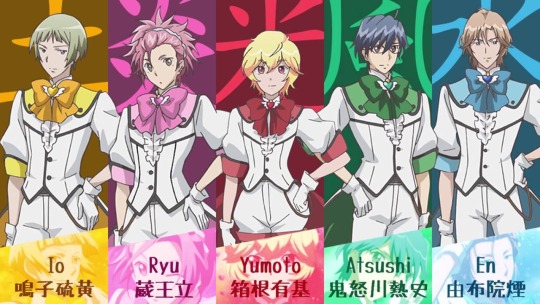
In general, it feels shallow and mean spirited. But no one calls this an insult to Magical Girls. Because people who like it don't actually care about Magical Girls. They see cute boys doing silly things and love it. Which is kinda sad.
Now, Gushing Over Magical girls has sort of that same problem on the Tres Magias…But they’re not the protagonists. And even then, in later chapters, they get power ups that are different in design, and thematically linked.
The protagonist, and the ones we follow, are Utena and the girls. And they all have very distinct outfits, all with motifs that are tangentially thematically linked, and speak of each character’s personalities in interesting ways.
Utena in particular has THIS outfit. Which a lot of people don’t like, but I actually do.
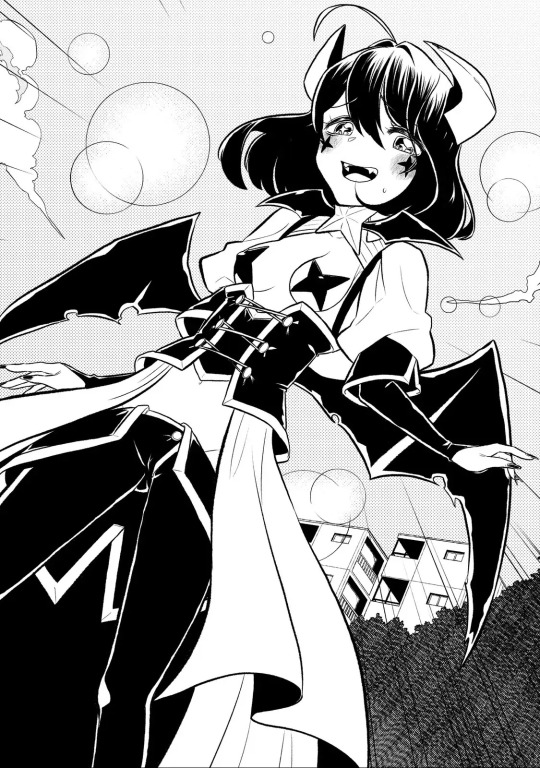
It’s very obvious it’s taking inspo from other iconic Bad Girls in the genre. Namely, Utau, Kraehe and Devil Homura. All “Enemy characters” that have unhealthy obsessions with other characters. In particular, I think the wings and the feathers resemble Homura - THE character known to have a massive obsession with a Magical Girl (Madoka), to the point of insanity.
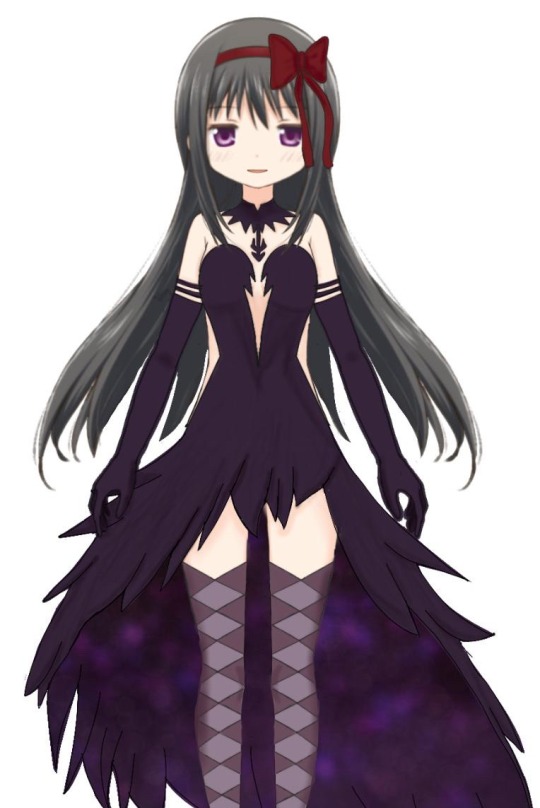
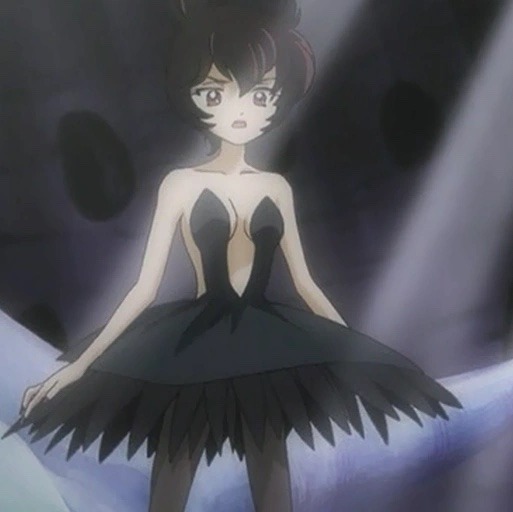
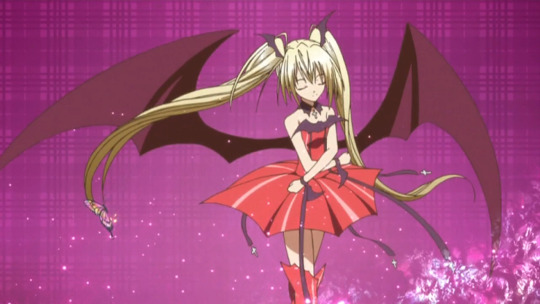
There’s also Magia Azure. Who’s a clear reference to the Mean Tsundere girl that is iconic to the genre. She’s also a Miko. Which is a callback to Sailor Mars, arguably THE girl who popularized this archetype.
I also love what they do with the mascots. Unlike Earth Defenders, where the mascot is you know, a mockery of the archetype of a mascot - useless, only there to give power ups, and obsessed with food - the mascots of GOMG is taking a book from Madoka.
It considers the mascots both all-too-powerful and yet limited in their reach. Which is exactly what the mascots have always been in Magical Girls. Beings so powerful they can give mythical powers to girls, yet helpless to do anything on their own. So, they use magical girls as a vehicle to achieve their goals. Most Magical girls try to paint this as a good thing, but newer genres shine light on how dangerous that can be too.
Madoka tackles it with Kyubey as the main initial mascot, only later to turn out to be the villain of the series.
And in a Post-Madoka world, trusting the mascots is just the slightest bit more difficult. That’s why, from the get go, GOMG portrays their mascots as morally corrupt. He’s not a good character, he’s malicious and doing more harm than good. But for the majority of the series, he’s painted more as a useless harmless evil than anything genuinely terrifying or worthy of concern. The attention is focused on other things.
But I love the way that it’s heavily implied that they’re not good. It’s a very interesting take on the mascot and it helps with the themes of the series. Which yes, by the way. Gushing Over Magical Girls has themes.
Which lead me to-
Part 3: Yeah, uhm, Gushing Over Magical Girl has themes.
There’s this idea that Sex is an inherently violent act. In which a man humiliates and sodomizes a woman, and therefore the woman is exploited in some way. And 10x worse is any act that involves BDSM. It’s violence; born out of hatred.
This is TERF rhetoric. I’m not joking. This line of thought leads directly to TERF ideas.
Many on the internet have pointed out as much, and BDSM members have gone to be very vocal about it. In particular, people on the role of the submissive (or the bottoms) are loudly trying to explain the contrary. How they like the act of sex, like the idea of being vulnerable, or being humiliated. There’s also plenty of LGBT+ stories that talk about it, both in western and eastern spaces. Just jump into the section of dom/sub verse at your local manga browsing website, and you’ll find something.
That said, the same is not as common for people who like to “dominate”.
I can only think of two pieces of media that argue that, whoever is the dominant or the sadist, is also a human being. That whatever they’re doing is done, not out of hatred for the submissive or an act of violence, but love.
One, is the husky and the white cat. In which Mo Ran, among other things, has to come to terms that his love isn’t “pure”. That he cannot love someone without the want to have sex, and to completely dominate that someone.
The second one is Gushing Over Magical Girls.
It’s very clear to me that Utena’s sadism isn’t a violent act. It’s an act born out of love. She genuinely loves the Magical Girls, and most girls for that matter, and whenever she is inflicting pain and fighting with them - what she wants is to ultimately help them in some way.
She wants them to “be the cutest version they can be” and wants them to shine brighter than ever.
There’s this one scene I love, around chapter 20, in which Baiser (Utena) is fighting Magia Azura. And due to Baiser going a bit too far, Azura ends up being Mind-broken. She crawls towards her, calls her “mistress” and begs to become her servant.
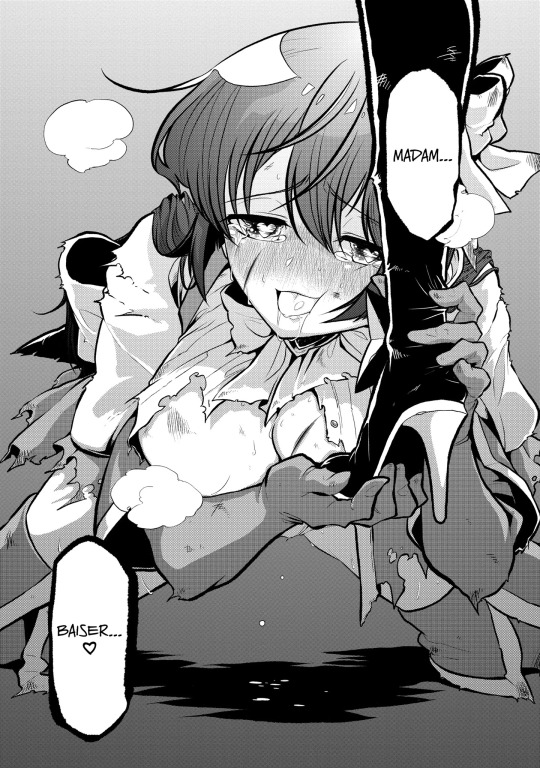
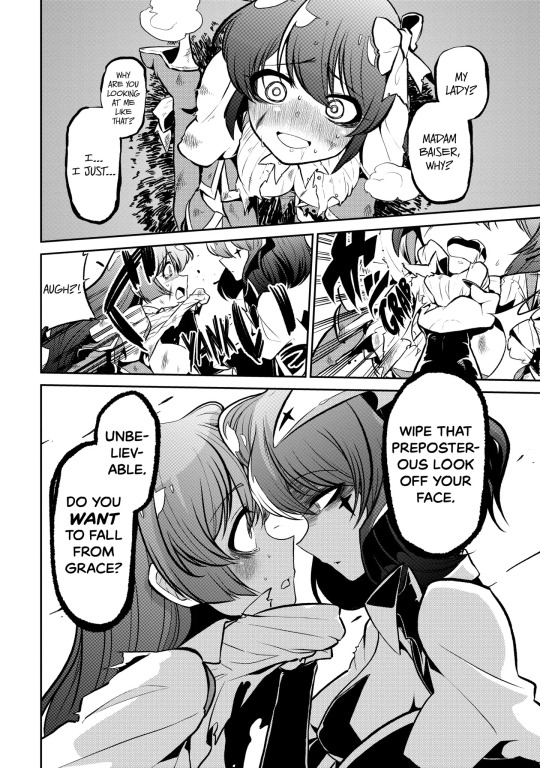
In any normal Hentai you’ll find, this is a good thing. This would be the ideal outcome. A character being turned into nothing but a sex slave for the enjoyment of the dominant.
Which is why I found it breathtaking when that didn’t happen.
Baiser is horrified by this. She does not want to break the girls, she wants them to be powerful. She wants them to win. With her, the evil one, being nothing more than a vehicle for them to be even stronger than before.
This is the first time I’ve ever seen dominant or sadist characters being presented both sexually, and in such a positive light. Much less a queer woman in the same position.
It doesn’t treat BDSM sex as a disgusting taboo act, but something born out of genuine love - and a want to see the other person be or feel better.
This is reinforced around chapter 25 where Leberblume and Loco Mùsica are fighting Baiser. For context, Loco Musica wanted to be an Idol, but had terrible singing. She uses her evil power to basically force everyone to listen to her sing (which is so reminiscent of Mermaid Melody btw). When they fight, Baiser wins, and is then set to use her new found power to “punish” Loco Musica.
Originally, Loco Musica points out how Baiser’s sadistic tendencies are “the same” as Lord Enorme, who we’ve seen uses sadism as a genuine form of punishment. Something to avoid. You behave well, because you don’t want to get hurt or humiliated by her.
However, when Baiser uses her own unique type of sadism on Loco Musica, something happens. Instead of causing her physical pain by beating her or using violence, she forces her to get naked and perform her idol song like that. This causes her to get extremely embarrassed. And in the process, she actually starts to sing really well.
This is important for two reasons
1) Baiser is actually taking into account who Musica is. It’s later revealed that Musica wanted a more frilly idol-like outfit but Lord Enorme shut it down, for the sake of a more ‘unified’ aesthetic. Baiser is not just throwing around the same treatment and punishment for all girls - what one might like, the other might hate.
2) At the end of the day, while she did the punishment, it was both embarrassing, but ultimately something that helped Musica and made her feel better.
And that’s really the key here, and why I love the series.
Sadism, sex and kinks in general are not tools of degeneracy. They’re treated as part of our experience.
Also, it’s just fun?
Part 4: Gushing Over Magical Girls is just extremely fun when you don’t have a dumb bitch yapping abt how unholy it is to see tiddies on a screen
Yeah, GOMG just has one of the most creative depictions of the most insane of kinks you’ll see - I could spent hour gushing over Nero Alice.
Seeing all these different kinks being depicted as powers and abilities that these characters have - and seeing how they interact with other people is just interesting.
The sex scenes are both hilarious and kinda sexy. Specially if you do like to see women all hot and bothered. Personally I’m not into girls (or anyone for that matter) but I have to admit the scenes were pretty hot. And there is no shame in admitting as much. No matter what the puritanical Christian on Twitter crying abt “god honoring lesbian sex” Will tell you.
I cannot begin to explain just how hype and relatable it was to see Magia Baiser defeat Lord Enorme with the power of straight up delusion, we STAN.
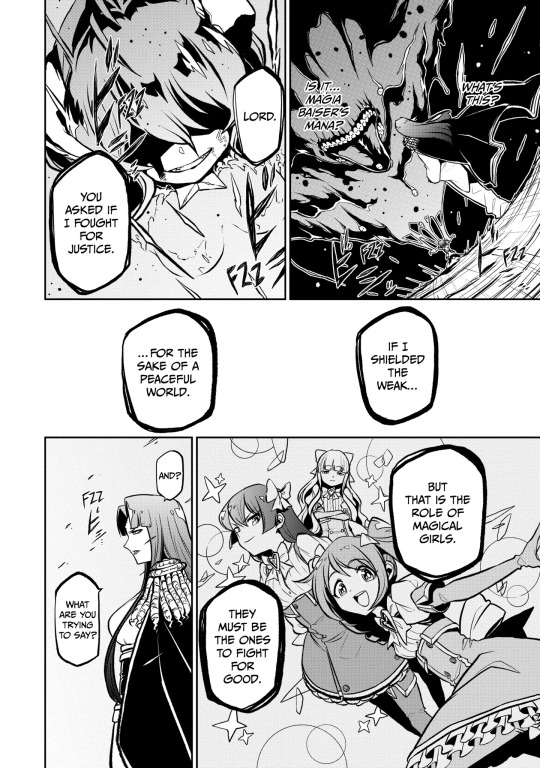
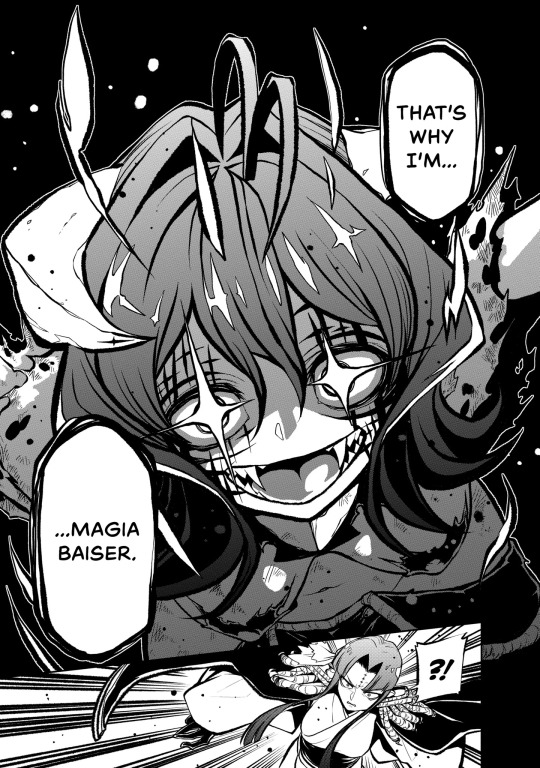
So, yeah.
It’s been a while since I last saw a Magical Girl Show so unashamed of being a Magical Girl Show. Unashamed of being weird, of praising the genre and just enjoying it.
My essay is titled, in part, as a joking reference to my much more popular series “MLB is the worst thing to happen to the magical girl series”. Which I still think is true.
And while, yeah, maybe GOMG isn’t the best thing to come out of the genre…I still think it’s good that it came out.
A lot of people say they want a more “mature” take on Magical Girls but - this proved to me that just isn’t the case.
Gushing over magical girls proves that the Magical Girl Genre Can Be so much more than what people think. More than glitter and sparkles, more than vapid action scenes, or what little girls want.
Much like any other genre, it can be raunchy, it can be messy, it can explore things outside of the status quo. But it can still deeply respect the source material, and the origins of it.
GOMG proves Magical Girls can be fun. Just. Straight up fun. Regardless of your age. They can serve and connect you to parts of yourself you didn’t realize you could connect to.
I hope it proves to more people that the genre can be so much more than “just for little girls” that parodies can be more than pointing and laughing, and that it can have themes beyond just, “friendship”.
Magical Girls can be so much more. You just, have to have an open mind about it.
#gushing over magical girls#looking up to magical girls#mahou shoujo ni akogarete#magical girl#magical girls#puella magi madoka magica#fate kaleid liner prisma illya
116 notes
·
View notes
Text
One commonality between thg and pjo that I love is that both katniss and percy at the end of their series have the potential to gain power/leadership roles etc and they both refuse because all they want to do is go home and try to find some peace and happiness with the person they love
Like katniss could’ve joined up with coin’s plans for vengeance or taken a similar route to Gale and moved to district 2 for a fancy position in the government/military- but she made the choice to return home to twelve and build a quiet life with peeta
And percy could’ve accepted that offer of immortality and become a *literal* god- but he refused it and went back home to be with annabeth, his mom, and the rest of his friends and family
But whereas so many (if not most) protagonists have these kinds of 💪glorious✨ endings where all of their hard work gets rewarded with power/success/etc- both of these teenagers basically just said “I wanna go home” and returned to their remaining loved ones to find some happiness/peace with them
And this kind of peaceful, quiet ending is *so* important and special to me 😭🥹
#the hunger games#everlark#katniss everdeen#mockingjay#thg#pjo#percy jackon and the olympians#percy jackson#ik percys story is FAR from over in tlo but still#when teenage protagonists get to act like teenagers
235 notes
·
View notes
Text
Gravity Falls is a coming of age series at is core about growing up but also mainly about how we grow up.

This is represented through the Pines twins protagonist duo: Dipper and Mabel. These two characters have what could be consider almost opposite approaches when it comes to realizing that they are getting older and their problems and world are changing as well.
For Dipper, we constanly see him trying to rush to adulthood. He usually tries to hide things that could be considered childish or foolish to enjoy such as it is the case of disco girl or going trick and treat with his own sister. ( "Dipper vs. Manliness" and "Summerween"). He often tries to pretend to be older and lie about his age to get the approval of older teenagers, like trying to go to teen parties. ("The Inconveniencing"-"Summerween").

Dipper thinks that he is as mature as a young adult, and in some ways he is, but in other ways this line of thinking makes do very foolish, reckless and even dangerous things- the opposite of being immature. This mainly shows when it comes to his crush on Wendy, someone who is clearly older than him and out of his league. A good part of his arc in Season 1 is about how he tries to impress Wendy without still fully understanding that he is still a kid and he is too young for her.
From what has been touched on the ¨Book of Bill¨, this behaviour may come from Dipper seeing an ugly argument from his parents that he wasn't supposed to listen to and this left a clear impact on him to the point he often has nightmares about it at night. Maybe he came to the conclusion that he has to ¨mature¨ and be more independent since he know there is something bad going on between his parents. However, it takes him time to understand that he can't become an adult overnight and is something is going to take him some years before doing so.

On the other side of the spectrum we have Mabel. In contrast to her brother Dipper, Mabel mostly has her mind occupied with things that have to do more of her age: Reading magazines and books, boy bands, playing with animals like it is the case with Waddles, ect. She isn't in a rush to be a grown up and chooses to live more in the present.
That's not to say that she doesn't have her own moments of insecurities like feeling she isn't as intelligent as Dipper ("Little Dipper") or trying to pretend to be an adult ("Boss Mabel"). Still, she doesn't seem she has this same necessity to hang out with the older teenagers or hide her interests as much as Dipper does. She is has less issus with acting silly or ¨childish¨ in front of others.
Mabel's main problem would be she wants to avoid growing up or remain in this more childhood state. While it doesn't get the same exploration as Dipper- at least not more until later in the show- Mabel is afraid of growing up and the problems that can come with it. In "Summerween" is where we see parts of this idea of wishing to be a child longer, explaining to Dipper that that was the main reason she wanted for the two of them to go treat and trick together.
What really hits Mabel is when she gets this really bad impression of what is like to be a teenager in "Dipper and Mabel vs. the Future". She gets very scared of growing up and what could happen to her. She wants things to remain the same and for the summer to last longer. This desire- along with other factors that made her feel like her world was crashing down around her- she got tricked by Bill possessing Blendin and telling her that he was going to ¨grant¨ her wish in exchange of Stanford's interdimensional rift device.
This makes her being trapped in fantasy world where she ¨never has to grow up¨. Everything is cute and smiles, bad things don't happen and she doesn't have to worry about any serious changes... But she realizes that this world is fake and that at some point she has to grow up and that things can't always stay the same.
Part of me wonders, that in spite of not having seen that terrible argument that Dipper did, Mabel is aware that something is going on with her parents and tries her best to ignore it. I think she may be scared things changing in her family after the summer ends- maybe more fights or one of her parents leaving- this gives some hindsight to some of her issues in the show.

By the end of the show and Dipper and Mabel's character arcs we have two important lessons about growing up: One is that things are constanly changing and growing older is inevitable but we don't have to rush it and maturity comes with time and learning about new things in live. It is important to live in the present while also realizing that there are going to be changes from time to time, from good to bad, but that doesn't mean it will be the end of the world if it happens. That is just part of life.
378 notes
·
View notes
Text
i Love NPMD's subversion of the trope where the supernatural haunts the bullies who rightfully deserved it. you have famous horror figures in movies who hurt the characters for revenge, because those characters held some power over them or knew someone who did – think carrie white, or iterations of freddy krueger or jason voorhees, the latter's mother, etc. you have modern stuff like unfriended and subsequent films within the genre, where "the ghost did this because they were bullied by the protags" becomes the main premise. because the trope is a staple in horror, whenever it shows up we think the characters deserve these deaths for what they did to the victim anyway; we just come for the spectacle. the inciting incident itself always shows their pre-existing behavior and actions, and explains why the movie happens.
but the thing that NPMD does is give that power to the bully. max is able to continue terrorizing nerds because of what was done to him. the only reason we don't completely sympathize with him (i would love those fix it fics where he gets to change after the accident) is because we understand the nerds' point of view. they dont do it because they would get a kick out of seeing him humiliated, they do it to get him to stop hurting them. they do it to survive. thats why we know they dont deserve it.
imagine if NPMD was a super serious horror film, where the waylon house accident was a flashback only shown in the 3rd act? it would be a decently sized twist to know that our brains are used to expecting a sympathetic backstory to the ghost or an evil side to the gang when no, he was the asshole.
i also love how it subverts the other horror trope too. usually the aforementioned horror icons go after those popular kids because of a movie's intent to punish vices. people who party and fuck are meant to die. if it were any other characters like, let's say, teenage and meaner tom houston and becky barnes, they would be wiped off the board without a thought.
but the protagonists are the titular nerdy prudes. people who want to party and fuck but dont. who only could in a world without max's strict social hierarchy, when outliers to their group like steph could be able to convince them to.
i also dont know if this has been said before but man i love figuring it out now
i probably have more thoughts on this but uhh later I LOVE YOU STARKID
#starkid#npmd#nerdy prudes must die spoilers#npmd spoilers#team starkid#nerdy prudes must die#im sure im not the first to realize this but come on pls its so cool to think about#hatchetfield
831 notes
·
View notes
Text
Zuko and Azula in "The Beach"
Lately I think a lot about "The Beach" episode [x], especially about this small detail of great teamwork Zuko and Azula have during the game.
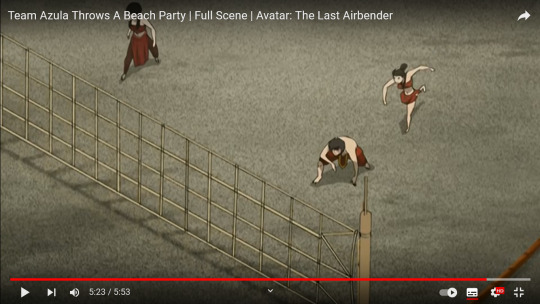
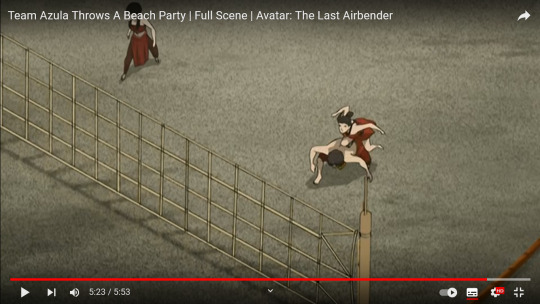

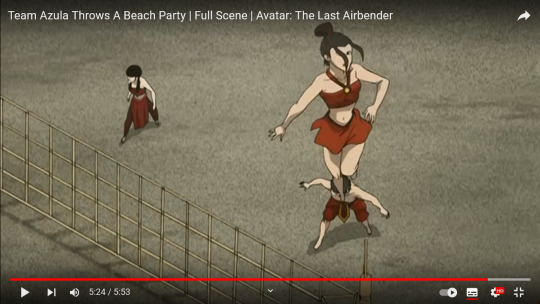

Zuko is looking ahead, directly facing their rivals (who had the control of the ball at this moment) but his body is clearly lowered to the ground, left hand most likely touching the ground, legs bent and widely spaced - a clear contrast to Mai standing near and how he stood before on two separate occasions

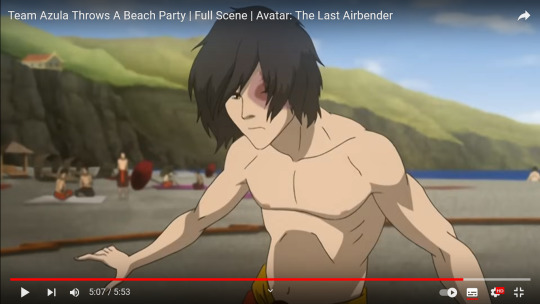
which is why I think Zuko willingly create an opportunity for Azula, so she could jump higher - something she definitely used to their team’s advantage. If Azula simply jumped on her brother’s back when he wasn’t expecting it or wasn’t ready, he would probably just fall face down from the impact but as the scene shows, he had no such problem nor was angry about it in the following scenes.
During the game sequences there was no dialogue shown between our protagonists, so it is hard to determine if Azula in advance called Zuko to give her a “lift” or Zuko offered on his own, or did they were that much in sync they just acted without thinking. Regardless I like this few seconds long interaction, because for me it implies how they trusted each other despite all the rivalry and bitterness from previous episodes. Like Zuko trusted Azula won’t use that moment to hurt/humiliate him by overuse of force, the same as Azula trusted in Zuko’s strength and that he won’t mess up by losing his balance. It is a small thing but no less sweet to see them working well together when fighting for the same goal - what reminds me a bit their teamwork from the previous season finale.
Interestingly, it was also the second time Zuko assisted Azula in scoring against their rivals while not scoring himself any point on screen. The first time happened almost right at the beggining of the game (second from total five sequences)
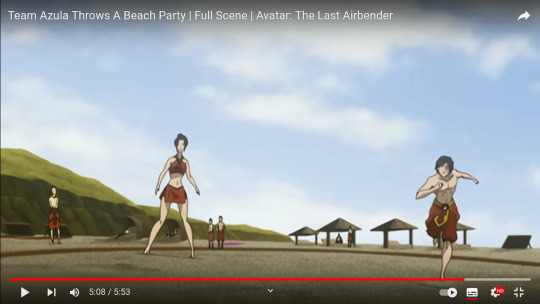
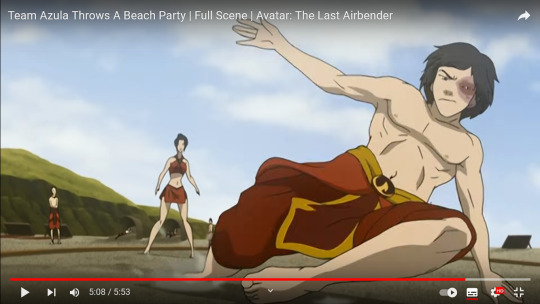
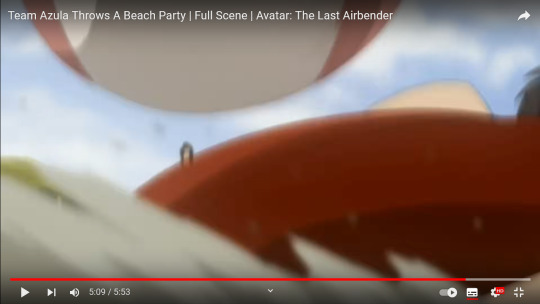

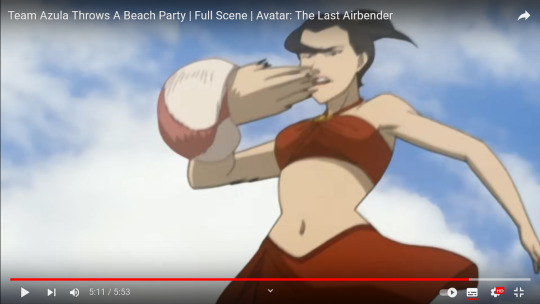

while each girl have the solo sequence of winning a point:
Azula's first attack,
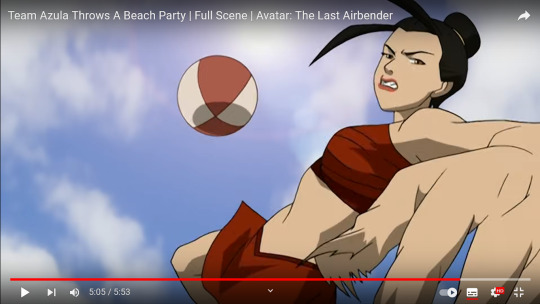

later Ty Lee landing on the net
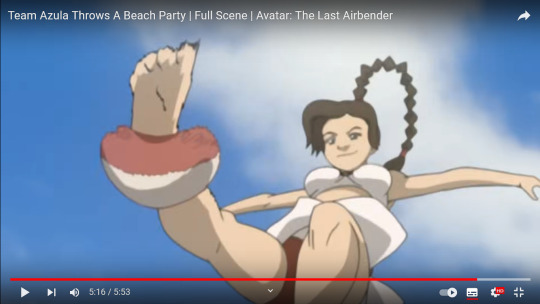
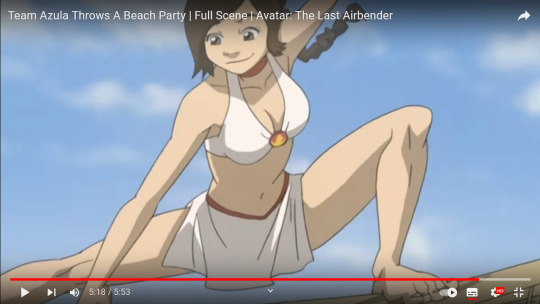
and Mai kicking the ball (and presumably scoring)
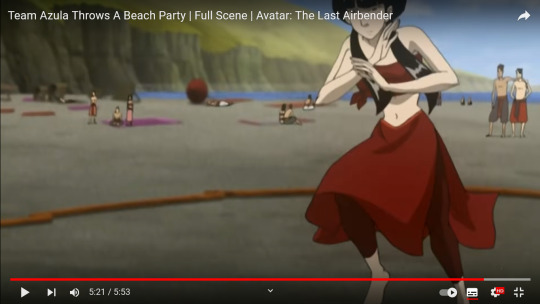

while Zuko’s two actions are shared only with his younger sister while there is no sense of competition between the siblings, something contrasting a lot with some previous and later episodes.
Azula is bossy and competitive through most of the episode and her brother lets her be that without a complaint. Azula and Zuko get along pretty well and A) do not argue (with the exception of the campfire scene and then they argue not even for the whole scene itself) and B) don't get on each nerves the way they do in the palace, with Ozai's presence looming in the back of their mind. I absolutely adore this episode, as it humanizes all our Fire Nation characters by showing them as teenagers outside the war zone but also giving us a bit of insight into what Azula and Zuko could be if Ozai didn't pit them against each other. And they could be a great team!
#atla#avata#avatar: the last airbender#prince zuko#azula#mai#ty lee#zuko and azula#fire nation#fire nation siblings#avatar: the last airbender - the beach episode is such a great mini story#look i have a lot to say about zuko and azula and their messed up relationship but this episode just make you realize how much azula & zuko#are socially awkward teenagers who have no idea how to interact with their peers#but also the deep of their bond shattered by ozai's abuse and yet somehow still connecting them on emotional level#when they can be just kids not ozai's perfect soldiers and heirs#also zuko just tagging with azula's friends is both funny and sad he has no friends of his in fire nation#while sokka will be the first boy befriended close to his own age (with aang a bit younger and lu ten some years older)#i think a lot about the tragedy of azula and zuko okay? a lot as in too much
346 notes
·
View notes
Note
I read your post about Tom Riddle being a golden boy and you are SO right, in fanfics you usually see him as this scary boy that everyone is afraid of, but I feel that a story where Tom Riddle is exceptionally charming with the protagonist and has a relationship with her where he subtly manipulates her or where when she wants to think "he's treating me badly" the others are like, "but he's so good! you're being dramatic" it's even darker than when they write him as a dark teenager almost bully of the first years, lmao

Nooo because that's so true :((
Everyone in Hogwarts absolutely loves Tom Riddle, and you did too, until one conversation with Dumbledore made you rethink everything you thought you knew about your beloved Tom.
It's almost as if you're seeing for the first time, as you are actually able to start to notice the subtle cracks in Tom's perfectly crafted facade. You didn't call yourself a master at knowing body language, but you knew enough about it to notice the fake way he acted around everyone—including you.
It's only when you make him angry for the first time do you actually get a hint of what he is truly like. You get absolutely terrified as he lashes out at you, and you didn't know whether to be more scared about the fact he was so calm about it or the way he held his wand like he was about to do something with it.
You try to tell your friends about it, but all they do is wave it off, acting as if you were just overreacting to a little spat that you and your boyfriend had. The chilling part is that throughout the whole conversation, you can feel the gaze of Tom from across the courtyard—it was like he was watching you like how a predator watches its prey.
And throughout the whole situation, Tom is cursing himself for getting so attached to you because you could easily ruin his entire plan before it could even come to fruition.
193 notes
·
View notes
Text
Lore Rekindled; The Lore Olympus that should have been
To be honest, I checked out the rekindled version before the original one and now having reading the original as well, it's extremely odd. Y'know goodbye volcanic high where the original was a mess but a group of 4chaners made a parody game which turned out to be of better quality than the original? This is like that but replace 4chan with tumblr users, mainly @genericpuff whose series is pinned in their tumblr blog where you can check all of the episodes, especially updated ones. In this post, I will be praising this series of how it fixes the problems of the original
The Pacing
One thing I notice about lore olympus and lore rekindled is the pacing. Not just the flow of the story but where it chooses to focus on. Now in lore olympus, the pacing is kinda a mess and its mainly to do with what it focuses on. An example is the magazine plotpoint; in the original, its basically kinda there in between doses to focus on other stuff like persephone and hades together, persephone's sa (i'll get to that later), eros story, zeus and hera etc...The flow generally isnt that bad per say (except for persephone's sa cuz that was way too quick) but for a story meant to be a romance between hades and persephone, you'd think it idk, it would focus on persephone and hades specifically, not eros which is another example of; its flashbacks. Eros specifically has such a dragged out flashback in episode 12 which we didnt need or at least with that much exposition when it should've naturally expand in the story and that's what rekindled does. The magazine plotline has turned into the first conflict of persephone and hades as we see how it affects their lives and relationships. This works for its pacing better because it doesn't give you too much stuff to jumble with, making the narrative more concise and easier to understand where the story is going. And with the flashbacks, rekindled cuts out the fat in the flashbacks from the original to a perfect balance where it gives exposition of the characters while also leaving mystery for the audience to be intrigued, my favourite one would have to be this (though it more of a nightmare than a flashback specifically speaking);
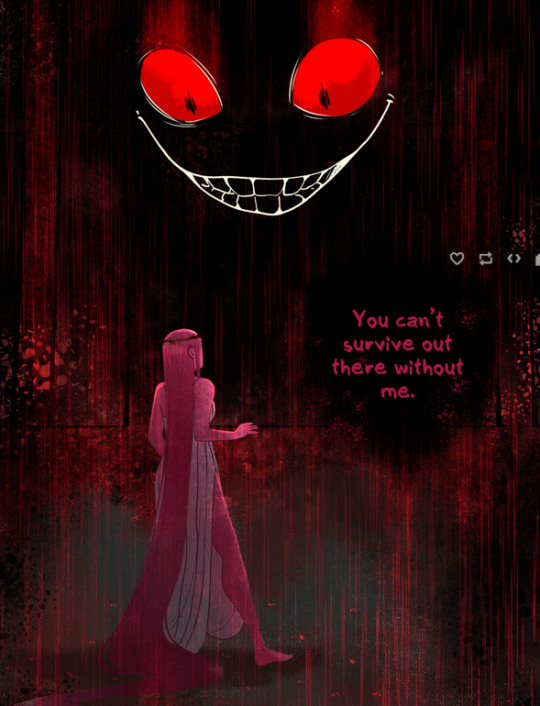
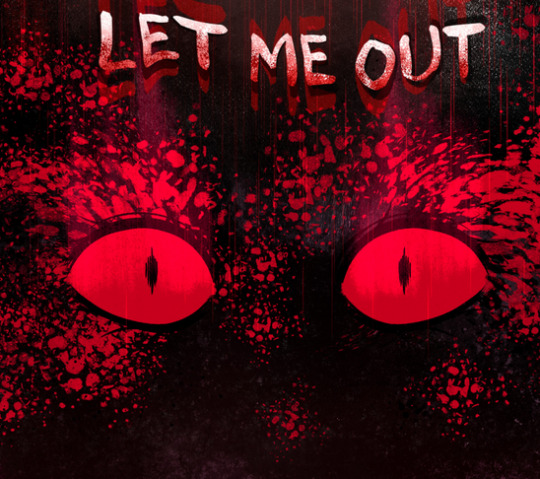
It's of persephone in a greenhouse her mother placed her in with this red eye thing following her from outside the greenhouse. I have no idea of this lurker if its her metaphorical rage or a danger in her life but either way, i am intrigued by its presentation.
The Characters
When reading lore rekindled and lore olympus, the characters are definetly an odd experience. For lore olympus, the characters arent exactly uh....great per say. I think the main reason for this is how their ultilised, with characters like eros, hera, hectate etc being there to mostly be a matchmaker for hades and persephone even if it was initially seen as wrong like with hera and hectate, be antagonistic as a way to have conflict between hades and persephone like minthe, demeter and recently leuce even if ones had reasons too like minthe with hades emotionally cheating on her and demeter because lets be honest, she had a point. Then there's hades and persephone, whoo boy where to start with them.
Hades starts off as a creep eyeing at persephone during a party, specifically at her body and still lusts persephone even being aware that shes 19 and he's 2000 years old. Also is a shitty boss, father AND contributes to slavery with it while being adressed in some way, doesnt change him which isnt good for a character that's meant to be the main protagonists love interest.
Persephone though, I can get the self insert vibes. From favouritism towards the story, being who most of the men in the story are attracted too, portrayed as a 'cinnamon roll' (they actually said that early on in the story, im not kidding) who cant do no wrong. She acts like a teenager rather than a young adult which makes the scenes where shes sexualised just more uncomfortable (and they already unnecessarily were) along with adding that uncomfortability to the romance
But with rekindled, they expanded on the characters much more than they originally were. Persephone for instance has turned from a 'sexy baby' legal teenager to an actual young relatable adult with agency and allows her to screw up (e.g, getting drunk on her own rather than eros drunking her). Her adult attitude makes the romance between her and hades not only more palpable, but also strays away from the infantilisation/uncomfortable sexualisation of her character which is nice to see. Hades also is written well in the series from how it acknowledges his faults while still making him likable. And thats the same for every character really, their personalities are much more fleshed out and nuanced which makes their characters feel real to life, gaining effectiveness for more emotional scenes with them. An interesting thing too is that they even expanded the magazine guy's character from making fake news for profit into feeling guilt over what they done, standing up for persephone which is a pretty nice change.
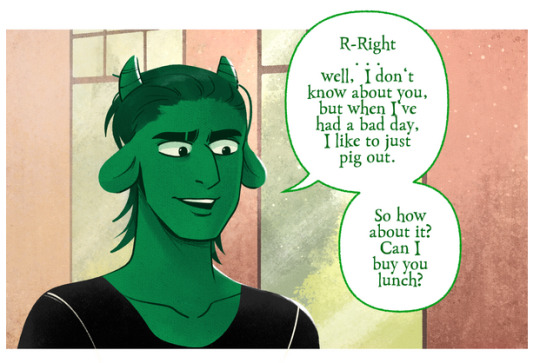
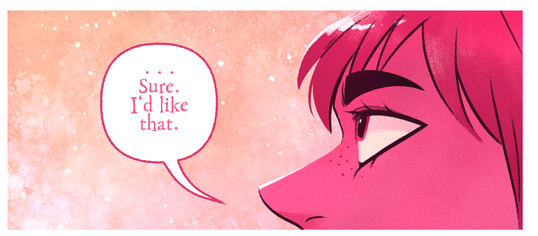
No Sa Plotline
Not like you cant have sa in your story ever but if you never planned it from the beginning and only did when people tell you that the scene you drew from your comic was sa then....maybe just not do it. Lore olympus does exactly that where while an attempt was made, it goes on to retcon it into making apollo (the guy who sa'd persephone) into a lesser evil like that would made a difference instead of just cutting it out from the very beginning. Lore rekindled thankfully just made apollo into his pilot version, a shitty bf but more likeable and expanded upon (which should have been his portrayal from day 1). His shittiness doesnt come up in the story, more like self absorbness/egotisticalness although with its recent chapter of the magazine guy offering persephone lunch, it might reveal some cracks or at least further down the story it will be revealed to us which futhers how effective rekindled character writing is in how its expansion of characters would give us the feels. That or portray him as not a good match for persephone, either way much better than the original.
Artstyle
Lore olympus has a pretty good artstyle (at least in s1/the early episodes, s3 is just kinda goofy) but lore rekindled has got a good artstyle which is on top, more consistent too. Here's some examples;
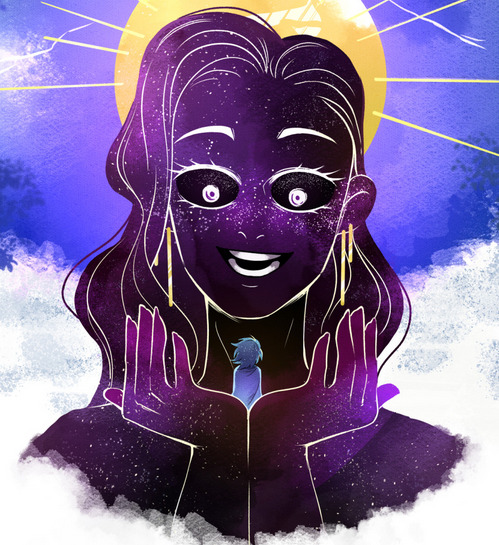
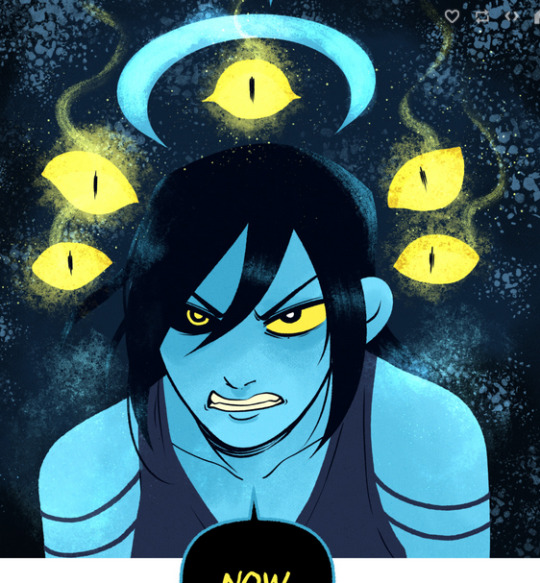

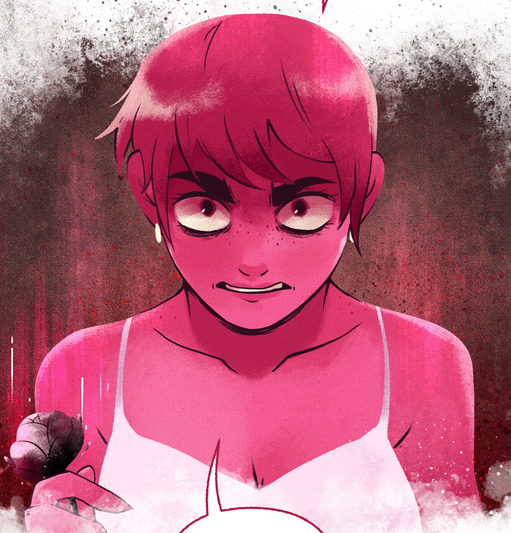
Comedy

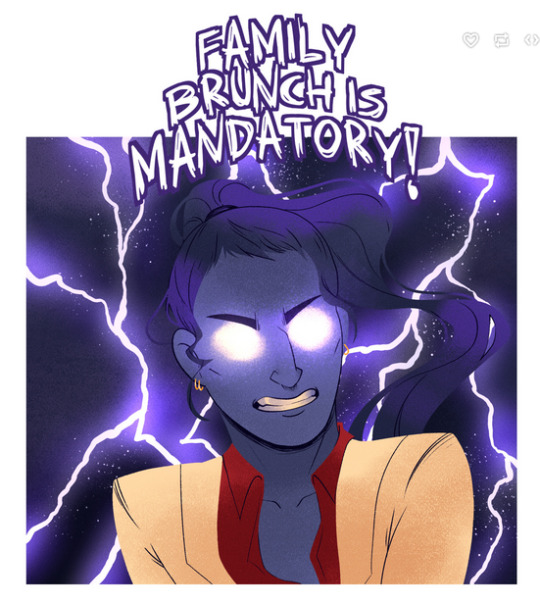


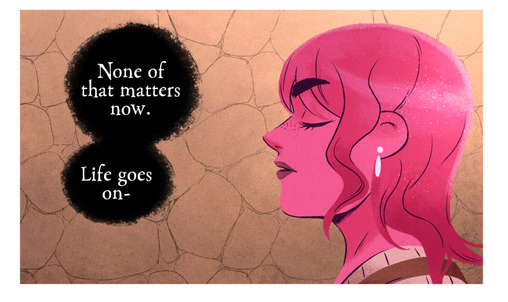

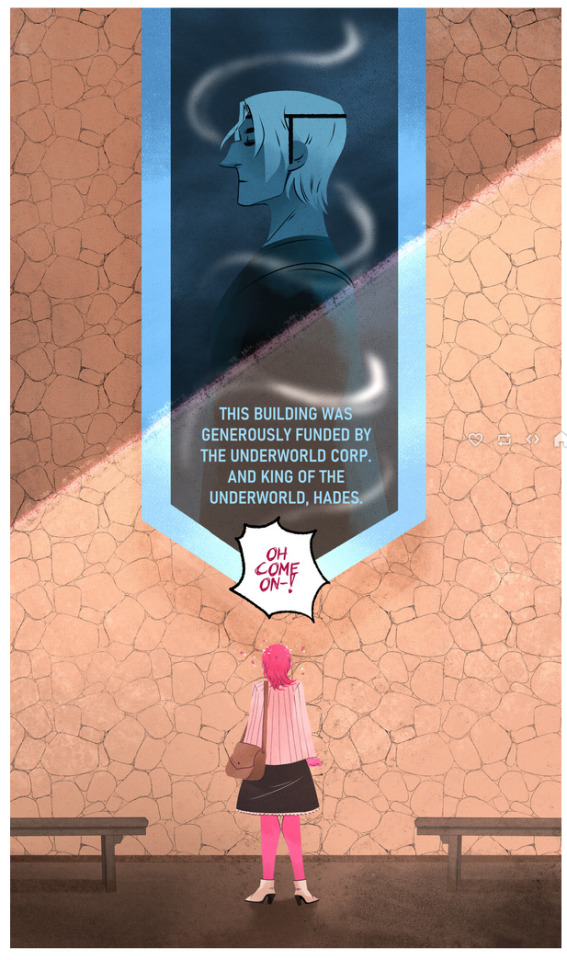
It's objectively funnier than lore olympus, no question asked
All in all, if you want to read lore olympus, i recommend you to read the lore rekindled one instead as it's better in every way. Give it a read.
#lore olympus critical#lo critical#anti lo#anti lore olympus#lore rekindled#generic puff#genericpuff
907 notes
·
View notes
Text
So y'all know how Jeff Combs was doing a theater production which someone involved with Re-Animator saw him in, and how he's suggested that the character he played there influenced how he played Herbert West.
I relayed this to @andalusiapunk and they were like "Oh! That explains it! He's theater-acting!"
I am not an expert by any means, but I did misspend my teenage years in a magnet school as a theater student. I understood immediately what they meant by theater-acting and I'm mad I didn't come up with it.
A lot of this has to do with Herbert's overall physicality. We all love talking about how he's hyper-dramatic, right? How he moves in a particular way that is extremely precise and sharp and, to be on point, theatrical. How he spins the tape recorder in his hand; how he offers Meg's heart in BRIDE; how he fumbles or manipulates syringes in various scenes.
None of that's in the script and it's not necessarily justified by what's happening... unless you're trying to make sure the audience in the backass end of the theater can see you're holding something small, like a tape recorder or a syringe or a human heart. As I observed elsewhere, you can trick the audience into 'seeing' or 'hearing' things that aren't present onstage or screen if your body language insists on its reality.
And, not to get into super-nerdy film history, but: originally theater-acting and movie-acting were one and the same. Early films are blocked like plays, they have extended sequences without constant cutting between shots (like an audience watching a play), and the extremely clear, over-enunciation of a play-actor trying to make sure those poor bastards in the back can hear what they're saying. And like a play, all acting was heavily rehearsed and expected to hit the same points and produce the same results every time.
What changed this was Marlon Brando introducing the idea of improvisation into movie-acting, a choice which also led to a greater flexibility in movie-acting... including delivery of lines. A more "natural", verisimilitudinous delivery became acceptable for films. This doesn't make either style bad, to be clear: each serves its purpose.
Bruce Abbott (to name the most obvious example) is doing movie-acting. He's got some Protagonist Accent going for him, but he has a clear variety of tone and a great deal of subtlety with his facial expressions and delivery. The same goes for the rest of the cast, although David Gale kind of straddles the line between these two styles.
Herbert's delivery is pure theater-acting. When he and Dan invade the morgue, Dan is whispering--but Herbert is stage whispering, which is why he hisses so much. I've made jokes on here before about how Herbert was born on Skid Row in Little Shop of Horrors-verse, and he thinks he's supposed to be in a musical... and, you know, LSOH is a film based on a play, only in that movie, EVERYBODY is theater-acting.
Anyhow, lotta words to find a different way to compliment Combs and the rest of the REANI cast on their acting, because I live for sorcery enjoying these damn movies.
#reanimator#re animator 1985#bride of re animator#bride of reanimator 1991#jeff combs#bruce abbott#david gale#acting#meta#uninformed commentary#i live for analysis#nothingenough speaks
172 notes
·
View notes
Text

I think the most notable bit of character insight on Yoo Joonghyuk that Yoo Mia SS provides is how much the apocalypse did not change him at all.
It's one of those Big Themes orv has, and simply brilliant writing. Y'know how they kept beating us over the head with the concept of 'the people who find it easiest to adapt in a ruined world are those who could not adapt to real life?'. That applies to YJH too, and even more than other characters. But it's hard to notice on a casual main story read because genre conventions and his character archetype tell us not to look deeper, that he is just a basic brooding power fantasy manhwa protagonist, even when he's really not.
So the audience writes off his quirks because it's expected of his brooding hero archetype and the other apocalypse survivors write off his quirks because everyone who has gotten this far is a little nuts and also they have bigger problems.
But when Yoo Joonghyuk acts exactly like he does during the apocalypse in a pre-scenario world where there's no convienient explanation it's really clear that he is different and he just comes off as...off.
His silence during conversations is no longer mysterious and cool but just weird and a failure to read social cues. His 'glare' is frightening and people don't like when he makes eye contact with them. His manner of speech is off-putting. His blank emotionless face is not stoic repressed hero-esque but ""rude"" etc etc. Every single mainstream society conforming person can tell there's something off about him so they avoid him. And YJH doesn't know how to communicate so he ends up totally friendless (save for a literal mafia boss and a crazy time-traveling teenage girl - and only them, because they don't fit well into society either.)
Umm where was I. So, but I don't know how much effect all of that has on World of Zero. Firstly, because between Yoo Mia side story and World of Zero there are 3-4 years of '?????' where afaik we have no idea what Yoo Joonghyuk was doing. He stopped being a gamer at some point but also got rich at the same time (doing what?) and bought the house he daydreamed about and also became a total shut-in who 'doesn't go outside often'. I have fanfic-y theories but nothing canon.
Onto the second part of the ask.
With World of Zero era joongdok I feel like there's a lot of writers out there who have made their own versions that are better than anything I could come up with so I hope you wont be disapointed. That being said I do have some thoughts.
Speaking of fanfic, here is mine under read more lol.
I think it's super that Kim Dokja gains the power of an omnipotent god and the very first thing he does is devote his time to Yoo Joonghyuk's happiness and safety. The whole reason he became OD was because of his massive guilt complex about YJH, so it makes sense that he would try to atone.
Zero starts off mistrusting him but gradually KDJ proves himself as having Zero's best interests at heart 100% of the time. DKOS is YJH's guardian angel. And then KDJ stays watching over him even after the scenarios were over, seeing him go through boring life milestones, happy as long as YJH is happy, for seemingly no reason.
So it's no wonder Yoo Jooghyuk fell in love.
He might not know Salvation's real name or appearance or anything about him but he wants to get to know him, this person who has saved him so many times while asking nothing in return. It doesn't matter that he's a constellation because he is good, Yoo Joonghyuk knows. He confesses all of this to Salvation, looking up at the sky with eyes sparkling with life and passion.
Salvation lets him down gently, for what it's worth, but rejection is still rejection and it hurts.
In the following weeks, as he goes through the motions and pretends nothing happened, he continues to feel the gaze of Salvation on his back, but the constellation stays mercifully silent. Yoo Joonghyuk does not want to know if it's pity he's looking at him with. Even heartbreak heals, of course. Months pass, then years. Lee Seolhwa was a dependable companion to him during the scenarios and stays a steadying presence in the world after. They're compatable. She is someone with who he could see himself growing old.
Salvation told him to 'be free, to fall in love with someone who could be with him, to not waste his time chasing after a dream, to live his life to the fullest'
He knows about his attribute of course, just like he knows everything about Yoo Joonghyuk.
Yoo Joonghyuk sees no point in lying. He tells Lee Seolhwa everything. How due to his attribute he will grown old and die while the rest of them stay youthful as ever, how he doesn't remember his childhood or know his parents. His hopes and dreams, how he yearns to learn his origins. About the first scenario, about the constellation who would have been his sponsor, whom he loves.
Then he asks to marry her. She says yes.
Salvation is the first person Yoo Joonghyuk tells. He's happy for him, of course, says he always knew there was a spark between them.
They live a long 50 years together.
When Yoo Joonghyuk's hair started turning more salt than pepper, he told Lee Seolhwa that he wouldn't hold her. She laughed, stroked his head and said that she might not look it but she is two years older than him, that she vowed to be by his side till death did them apart and she will not break that promise.
When his time comes and he knows he has to leave, he tries to explain himself to Lee Seolhwa at least, if not the rest of his old companions. But he needn't have bothered. Before he could start, she took his hands in hers and smiled wistfully. She told him she always knew this day would come. That his heart has always belonged to someone else. She's thankful for the time he has given her anyway and that she could not have asked for a better husband. She sheads a few tears and Yoo Joonghyuk does too, but he leaves their house with a sense of purpose and a lightness in his heart he has not felt once since the day he beat the final scenario.
And then he accepts the sponsorship contract with Salvation.
... .. Sooo, that's how I think round zero went.
#half meta half fanfic. what do we think about this format. also i screenshoted it bc i hate how tumblr now squishes the answer into a box#yoo mia side story#yoo joonghyuk#orv spoilers#my posts#orv#omniscient reader's viewpoint#omniscient reader#asks
126 notes
·
View notes
Text
okay everybody, listen up, because I need to talk about Edward Elric. I've started watching fmab and I am losing my mind over this boy. There's so many incredible things about this kid; he's such an incredible protagonist.
the realism of Ed is so painfully wonderful- this is a fifteen year old child. Remember what you were like when you were fifteen? Yeah? Fifteen is so young. This is a child who's had to grow up WAY too fast and has been through so many unspeakable things, but he's still a kid and he actually ACTS like it. He gets irritable over small things and acts "childish" when he's excited and has that touch of arrogance a teen gets when they know they're important.
Ed gets scared. He's not like a lot of your "unshakable" shounen protagonists, who, when faced with something shocking in a fight, eyes only widen and mouth only frowns and they only worry a little and maybe ask for an explanation. No, Ed is a kid and he gets scared. Sometimes he handles fights well, but sometimes he freezes. When Scar found him and Al, when he hurt Al and tore out Ed's arm and pursued relentlessly in the rain, standing over Ed as Ed writhed on the ground, Ed screamed for his brother and froze in his fear and thought he was about to die then.
He's so fifteen in everything- in his anger and his arrogance, in his fear, in his trauma, in his reverence of life. Ed is at the age when your eyes truly start to open to reality and society, though given his past he probably started earlier. But he holds life so preciously, so closely, cradles it in his arms and declares over and over again that it is one thing he will not trample, will not hurt. That fifteen-year-old conviction and the leftover naivety from childhood, paired with the newer discovery of just how sacred, how beautiful and important life is.
He's fifteen in his love. You ever been around teenagers, especially today's teenagers, and you know they do everything fiercely, most things boldly, and Ed screams it in his love. In his protection of Al, his absolute dedication and protection to the one person he has left, can hold close. He's a teenager in their banter but such an eldest sibling in every way- in his drive to protect Al from anything, everything he can, in his leadership, in his fear of losing his sibling.
Ed is such a real person, such a real kid. He's incredibly mortal, unlike a lot of op shounen protagonists. He hits his head and it bleeds. He gets impaled and struggles to stand at all. Every time he's injured we see him recovering in the hospital after. He has nightmares from his fear of failure, about Al and his mother and Nina. He's smart but not indestructible. He's incredibly earnest about his convictions, earnest about the beauty of life, just like a teen.
Edward Elric is probably the most realistic anime teen I've ever seen, and I love him SO much
#forgive me if there's anything in here that later episodes might contradict#I'm only on episode 15#i just have a whole lot of feelings about this kid and i needed to get them out#fullmetal alchemist#fullmetal alchimist brotherhood#fma#fmab#edward elric#fma brotherhood#fma edward#character analysis
2K notes
·
View notes
Text
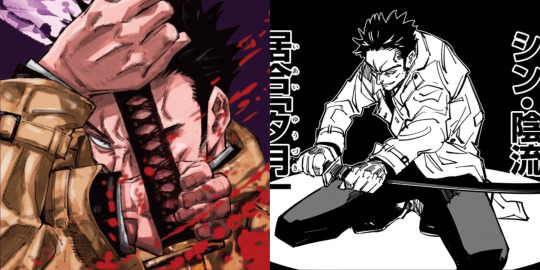

Kusakabe the Last Man Standing
Is Kusakabe going to defeat Sukuna all by himself?
Probably not. I fully expect Maki and Yuji to get back up and join the fight. However, Kusakabe is a character that has been slept on for awhile and with him being reluctantly shoved into the spotlight I think it's time to write a meta analyzing him. Especially since the revelation that Kusakabe is the strongest first grade fighter didn't come out of nowhere, in fact Gege has been building up Kusakabe in the background for quite some time which I'll explore under the cut.
So Okay, He's Average
I want to begin this analysis by saying that Kusakabe represents a type of character that Jujutsu Kaisen is desperately in need of. He's just a normal guy. He's our only example of an everyman character. Usually in manga the protagonist serves as the everyman character, especially ones like Yuji who come from a normal life and are being introduced to a fantastical world for the first time, but Yuji ain't normal. Someone who willingly eats a finger that may kill him just so he can be useful and save a stranger isn't normal. Gojo has Yuji pegged as one of the crazy ones within the first few chapters.
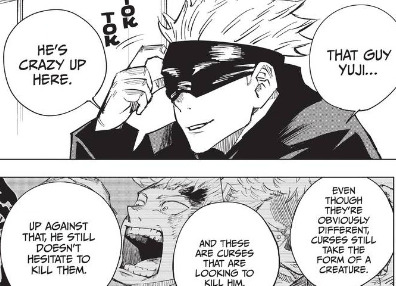
Gojo says that sorcerers have to be crazy, that the best Jujutsu Sorcerers need to be broken in the head otherwise they can't get over their fear of curses and risk their lives fighting them on a daily basis. The cast is full of eccentrics, Gojo the strongest of all isn't even able to relate to other human beings, Sukuna is termed a calamity, Yuta kisses cockroaches without hesitation there's not a normal one in the whole bunch.
The ones that are normal, like Miwa who acts like an average high school girl, has no technique, and Mai who desperately craves to be a normal girl and doesn't want to be a jujutsu sorcerer, either are minor characters or they die.
You could say Ijichi provides the point of view as a normal character, but he's a minor character at best and uninvolved in the plot. Then there's Nanami, who represents the typical japanese salaryman. However, Nanami is extraordinary in that he is far more moral than all of his coworkers, such as returning to be a sorcerer because the work helps people instead of keeping his cushy job, and prioritizing the lives of children over himself.
Us mediocre and average people are in desperate need for representation. Cue, Kusakabe.
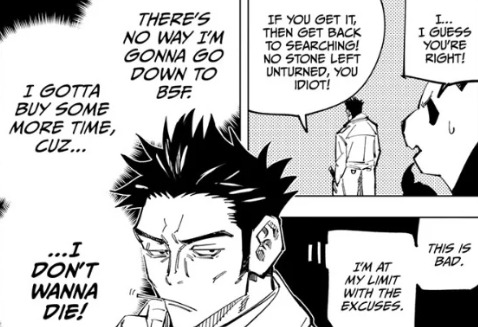
His introduction clearly demonstrates his attitude is different from most sorcerers, rather than running straight into danger, Kusakabe is trying to search for an excuse to stay out of danger where it's safe. While it's cowardly, it's also what a normal person would do in this situation. We are so used to sorcerers who either risk life and limb without a thought for the sake of other people like Nanami or Yuji, or sorcerers who enjoy the fight like Gojo that Kusakabe stands out.
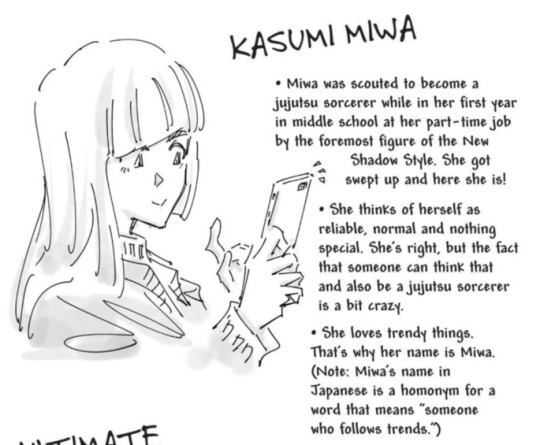
Miwa who is basically the example of the normal girl among the teenagers shares several parallels with Kusakabe, they're both simple domain masters without cursed techniques, they're both self serving, and also Kusakabe is her teacher and probably the one who recruited her considering he shows up to save her at the end of Shibuya.
Kusakabe is meant to represent what a normal person with common sense would do in the world of Jujutsu, but that doesn't mean he's weak. As I stated above Gege has actually been building up Kusakabe's strength in the background for quite awhile.
When training with Yuji, Gojo first brings up that some sorcerers rely on their techniques too much and that Yuji doesn't necessarily need a fancy technique to win, he can overcome them by learning to control his cursed energy and then using it to strengthen his already amazing martial arts skills and physical prowess.
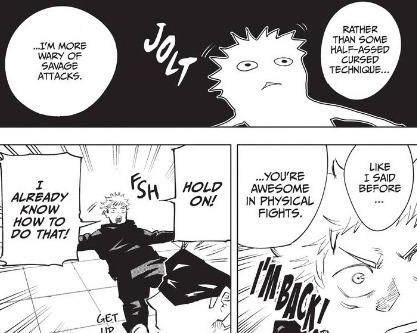
The Big Three clans like tend to overvalue inherited techniques too, the downfall of the Zen'in is that they didn't recognize the strength of people like Maki and Toji with no cursed energy because they believed their cursed techniques to be inherently superior.
In Mechamaru's fight against Mahito, Gege makes a big deal spending an entire page explaining the history and mechanics of simple domains. There's obviously no need to put this much attention into detail to explain simple domains unless they're going to come into play later, and while Miwa uses them as stated above she's a minor character.
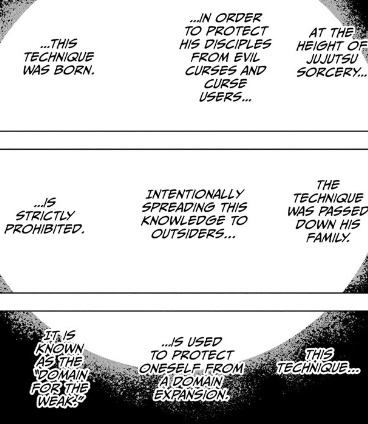
A technique called the "Domain for the Weak" what better technique for a normal guy like Kusabe, who is stuck in a cast of super-human characters. When fighting with Yuji, Mei Mei compares Yuji to Kuskabe.
"You're on par with a grade-1 sorcerer at this point. To be this good without a cursed technique... I think you're the only one since Kusakabe."
To further compare him to Mei Mei, Mei Mei monologues about how because her cursed technique of controlling birds is weak she tried to strengthen her body. However, eventually she hit a brick wall and couldn't get any stronger and reach Grade-1 on her efforts alone. Which is when she decided to start using Ui Ui as a tool to make herself stronger by making binding vows between him and herself to strengthen her, in addition to inventing her suicide crow technique.
However, Kusakabe is even stronger than Mei Mei and he managed to reach that level by himself without needing to groom and manipulate a child.
Kusakabe also spends all of Shibuya avoiding getting in a fight with a special grade cursed spirit, and yet at the end of Shibuya he ends up tanking an Uzumaki Maximum from Kenjaku at point blank. Kenjaku even praises him.
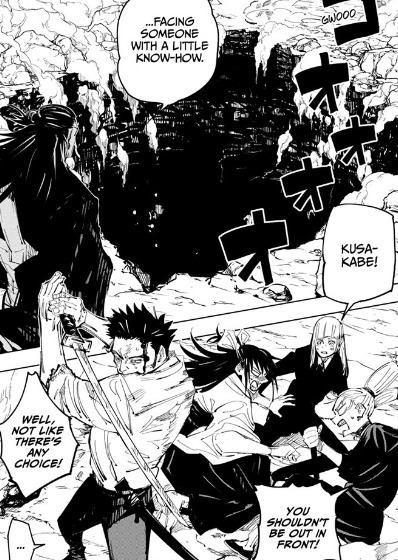
This is the same Kenjaku who can use Suguru Geto's cursed technique even better than Geto can, and who wiped the floor with Choso while bragging that a cursed spirit that's ranked Grade-1 like Choso could never go one on one with a special grade. We never saw Kusakabe directly fight Kenjaku (he would probably run in the opposite direction if given the chance) but the fact that he can use a simple domain to cancel out one of Geto's strongest techniques point blank is really telling.
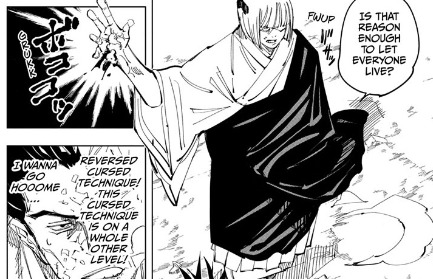
All the while having relatable thoughts like this one. In a lot of ways, Kusakabe reminds me of Todo, someone who Gojo mentioned as being one of the next up and coming star students alongside Hakari, and Yuta. Todo has a cursed technique that's simple but effective, but he also fights similiar to Yuji by his expert control of cursed energy. Todo fights mainly with his fists and martial arts and his impressive knowledge of how cursed energy moves though the body, his cursed technique gives him an added bonus.

Up until this point in the manga though Todo is the most knowledgable about cursed energy, he teaches it Yuji very easily and explains it in ways Yuji can understand. Fighting alongside Todo also brings out Yuji's full potential as a sorcerer. Todo is all muscle, but he fights with his head and is the smartest student in Kyoto.
All of this to say, Kusakabe's strength without a cursed technique can be explained by relating him to Todo. In the Gojo vs. Sukuna fights who is the main voice explaining to both the other students at Jujutsu High and the audience just how the battle is going down.
Kusakabe is not in there in the field, he's watching it on TV, and yet somehow he can disect and explain to the others how both Sukuna and Gojo are using high level Jujutsu Techniques. This is Sukuna and Gojo we're talking about, two geniuses who are the height of jujutsu and can often improvise and make up new techniques on the fly and yet Kusakabe is able to keep up with what's going on.

Kusakabe gives the play by play, he somehow knows what falling blossom emotion is even though he's not from one of the three big families. He explains to Hakari and Higuruma who are natural geniuses who don't quite understand how their powers work, how Gojo can change the conditions of his barrier and how exactly he made the barrier smaller.
Remember Kusakabe is also a teacher at Jujutsu High. Unlike Gojo who doesn't try to explain basic concepts to Yuji because he's such a genius, Kusakabe is also educating all of the students here and phrasing these high level techniques in ways they can understand. You can't really do that unless you yourself have an intimate understanding of the subject matter.
What I mean to say is by putting Kusakabe in charge of the discussion, Gege is demonstrating that Kusakabe is a character who understands the mechanics of cursed energy and domains on practically the same level as Todo who as we said is considered a prodigy. This is also some clever foreshadowing, because Kusakabe here seems like he's still a background character because all he's doing is essentially expositing to the audience and yet... how impressive must he be if he understands all of these advanced domain techniques when he's just a guy with a sword and no cursed techniques that uses simple domains.
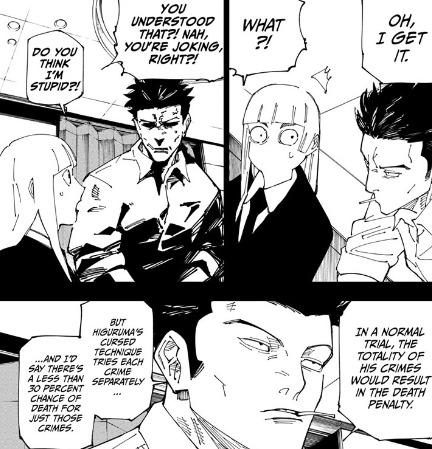
Kusakabe also understands Higuruma's legal talk in about ten seconds, and can explain the mechanics of Higuruma's domain and why their plan to put Sukuna on trial might not work. He is much smarter than he seems at first glance, Miwa even makes a joke about it. He even analyzes Sukuna's techniques after facing them head on once - and he's the only one who notices how odd it is that Sukuna's not using his fire technique like in Shibuya.
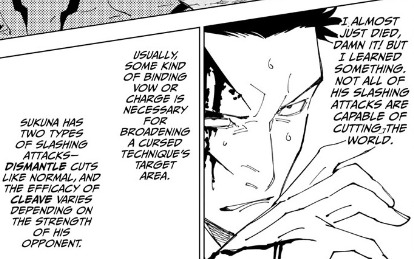
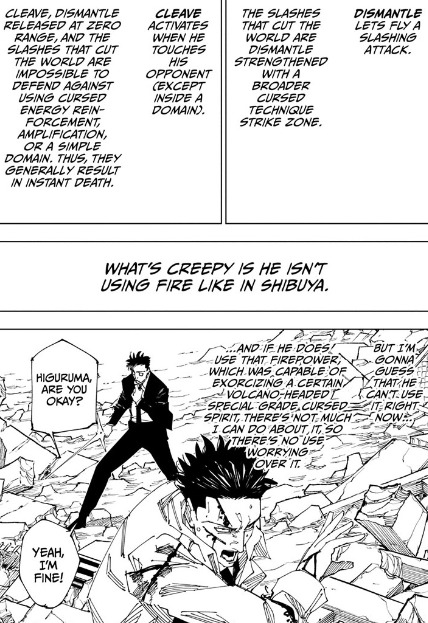
Sukuna mentions that Kusakabe along with everyone else's cursed energy reinforcement techniques must be on another level if they're able to stand up to his slashes (even if they're in a weakened state right now). After all, Ishigori who was not only one of the strongest fighters of his era but was also hyped up for his massive pool of cursed energy that rivaled Yuta's was torn to pieces by Sukuna's slashes.
Kusakabe also seems to be the one in charge of the strategy for the fight (though it was Angel's idea to let Takaba handle Kenjaku, maybe they're both coordinating but Kusakabe is definitely leading them in the field).
My point being, as much as he's accused of handling his large cast Gege is often able to give a lot of characterization in a limited screentime. Kusakabe is more than he appears to be, and it's clever how Gege built up his importance without anybody noticing, because Higuruma himself likes to avoid conflict, hide in the background and is constantly downplaying his own talents. Ino even made another joke about it last chapter.
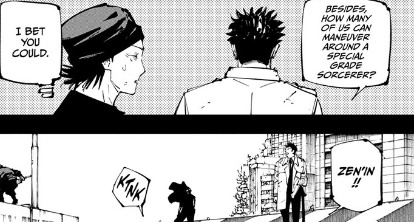
The commonly held view is that the sorcerers who reject their humanity and only care about refining their technique are the ones who become the strongest sorcerers. However, Kusakabe was able to climb to the top of the Grade One sorcerers despite lacking that attitude.
In my opinion, Jujutsu Kaisen is fundamentally about balance, so while there's a definite trend of Sorcerers who resemble Sukuna are the ones who become stronger - it's not presented as the only way to be strong. Yuji only defeated Mahito by cooperating with Todo. On top of that, Sukuna while finding Yuji boring admits that Yuji a mostly selfless person still demonstrates an indomitable will that Sukuna can't break no matter how hard he tries.
If Sukuna represents the thesis that the only way to become strong is to throw away all your humanity and become wildly selfish, then Kusakabe represents the antithesis as a mostly normal person (if a bit cowardly and self interest) who somehow climbed the ranks over people like Mei Mei who represent the kind of selfish monster Sukuna is.
This is actually the pattern for most of the Sukuna fights this arc too. Gojo and Hajime both represent the desire to be understood, and Sukuna rejects both love and says he doesn't need people to understand him because he understands himself.
Yuji is a human who is mostly selfless, and has inherited the curse of his fellow comrades as sorcerers, specifically carrying on the torch for Nanami who is also content to be a cog in the machine if it means he can help his fellow sorcerers out. Sukuna is a selfish monster, who is an individualist and sees other people as toys to amuse himself with.
Higuruma is a genius on the level of Gojo Satoru, but when challenged by Sukuna he ends up sacrificing himself instead in a direct parallel to Nanami in order to pass the torch onto Yuji.
Yuta's domain is literally called "authentic and mutual love" and Sukuna said to Hajime that he understands exactly what love is and he still rejects it. Sukuna's entire philosophy revolves around rejecting the love and friendship, while Yuta only fights for the sake of his friends, and can't believe that his life is worth living without people in his life who love him.
Sukuna gives a whole speech on how by rejecting cursed energy, and using a heavenly restriction to push her body to the peak of physical strength a human can achieve, she's forcing a role on Sukuna to compete with her as the peak of sorcery to determine which one is better.
Now it's Kusakabe turn to have a role in this fight too. While Maki has no cursed energy, she doesn't really represent humans because she's you know, a she-hulk. Kusakabe might be the most human character present that's willing to face down Sukuna. Kusakabe is the most human character someone who climbed this high without being born with any technique, Sukuna is the most inhuman monster in the series, a calamity that Yuji refers to as a true curse.
Gege even threw in these callbacks to Gojo panels.
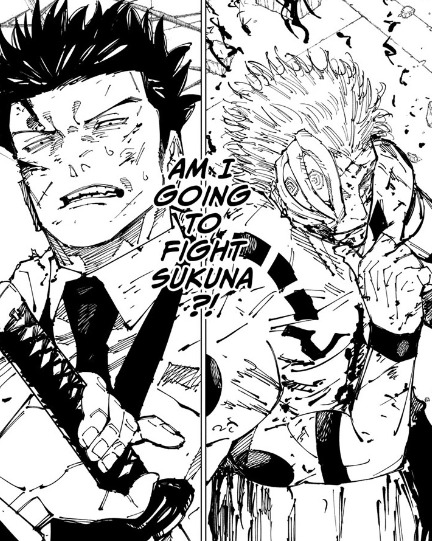

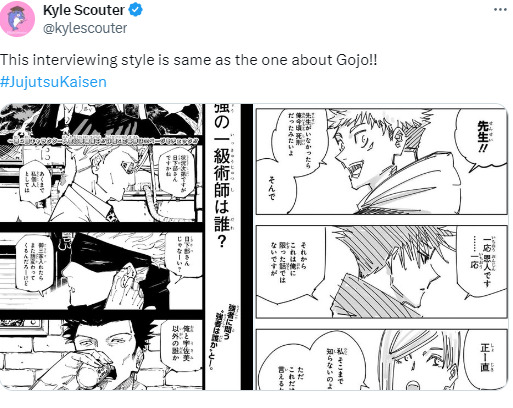
That in itself might be foreshadowing that maybe Kusakabe stands a better chance against Sukuna then anyone in the audience thinks. As the number #1 Kusakabe stan, I'm definitely willing to bet on those odds!
#jjk meta#jjk 253#jjk 253 spoilers#jjk spoilers#jujutsu kaisen 253#jujutsu kaisen 253 spoilers#jujutsu kaisen spoilers#atsuya kusakabe#ryomen sukuna#sukuna#gojo satoru#maki zenin#kasumi miwa
257 notes
·
View notes
Text
Steven Universe as a character is someone who has been mischaracterized and flanderized over the years, to the point people who aren't into the fandom or haven't watched the show believe that mischaracterization to be a fact rather that a product that comes from memes and jokes

The truth is that Steven often fights in the series when it is needed, usually by fusing with someone else like Connie or Amethyst since he is still developing his powers in the original series. He doesn't cry when he has to fight back or defend himself, with exception if the person attacking is someone he considers a friend. Because, yes, for a 14-15 old teenager it isn't fun having to do something like that and it can be traumatic.
He also doesn't start to cry the moment someone refuses to change their mind or is being mean. He often isn't afraid to be sarcastic or call that person out. He didn't cry when Aquamarine mocked him in ¨Stuck Together¨ nor when Jasper didn't apologize for poofing Amethyst in ¨Crack the Whip¨
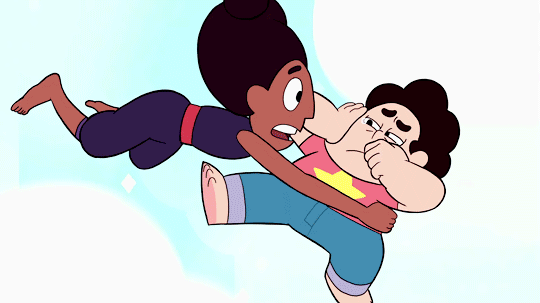
However, what we see is sometimes him blaming himself for not being able to help people that, more often than not, have been hurt by Rose Quartz, his mother, in some way. After Season 3, Steven fears a lot that he is going to become like Rose and he is going to hurt people the way like she did.
In general Steven deals with an Atlas complex in the show. He feels like he has to fix his mother mistakes and deal with ¨what she left behind¨ even when Rose wanted for him to be his own person as seen in the tape she left for him as it was revealed in the episode ¨Lion 4: The Alternate Ending¨.
Steven also defines his identity a lot for being to help other people and fix their problems. He believes that he has to be ¨useful¨ for others. So when he believes that he failed to help someone, that may lead him to think that he isn't living up to his ¨purpose¨ or that he is a failure as a person.
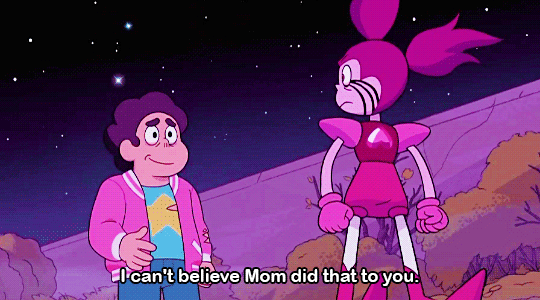
In reality, he isn't that much different from other hero protagonists from other animated shows. Those who are kind and emphatic and willing to listen to other people and give them a second chance if the person changes their ways. You probably like an animated show that has a protagonist like this. (Who was probably taken inspiration from Steven if the series came out after SU).
The main difference, i think, is that Steven goes a bit more than those protagonists do when it comes to listening to other people, understand their motivations and give them another chance if they regret their actions. A lot has to do with how he is aware that his enemies (usually gems) act the way the do because of the system they were born into rather ¨they are evil just because¨. He gets that their motivations come from the system that hurt them or lead them to believe that their actions are justified.
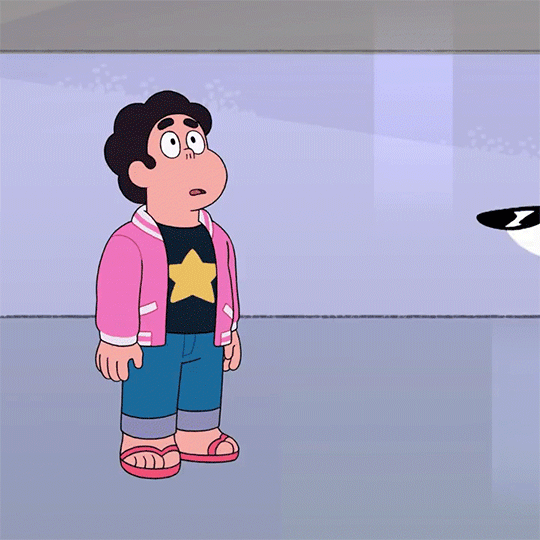
Another common mischaracterization is that Steven becomes super buddies with every person he helps...when this isn't always the case. There are some occasions that Steven shows discomfort around people who he has given a second chance. Just because he gives them a second chance doesn't mean that he immediately considers them close friends, maybe allies at best.
A good example of this is the gif above of Steven's interactions with White Diamond in ¨Homeworld Bound¨. White Diamond touches Steven very close to where his gem is- which makes Steven distressed since in his battle again White, she ripped his gem out to prove that Pink was still ¨alive¨. In most of the episode Steven shows to be very uncomfortable around the Diamonds and Spinel, to some extent. They bring him bad memories, which is the main reason he has been doing everything to avoid going to them to ask for their help until this point in Steven Universe Future. He even almost accidentally hurts White's gem by smashing her head against a pillar when she lets him control her to talk to himself. This being result of a intrusive ¨vengeful¨ thought.
I wouldn't say that Steven hates the Diamonds,but- he doesn't want to be their friend neither and wants to avoid in general because he feels nervous and bad around them. It's something like ¨I'm glad that you are changing but i don't want to be associated with you. Please, i would appreciate if you kept your distance from me.¨ dynamic.
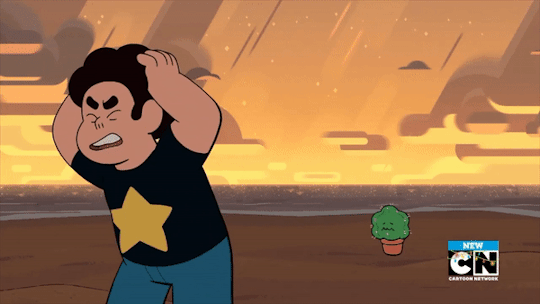
On last point, Steven is someone who usually pushes his feelings down in certain situations and buries them down, which has led him to have strong emotional outbursts in bad moments. He usually prefers to ignore his own problems and take priority on others. Again, this comes a lot from his desire to be useful and be needed, making him trying to ignore how he feels about certain people and pretend that he is doing fine.
This explains why we don't see him lash out that much to others in the original series, and, why he feels so frustrated and angry in Future, since all that anger and negative feelings can't no longer be ignored as they used to and they are having a negative impact in Steven's mental health. This, of course, isn't meant to be seen is a healthy coping mechanism. It is in fact potrayed as something pretty self-destructive for Steven, as a huge flaw of his, that over time he comes to learn that it isn't the best way for him to deal with his problems.
These are some of the most common misconceptions i have seen about Steven's character online. I could go in more depth with some of them but i think the points should be clear enough. This could be considered a general analysis of how Steven is as a character and how he operates, leaving aside more specific things that can be covered in other posts.
1K notes
·
View notes
Note
for a show who's creator openly and shamelessly calls people abuse apologists, ML's tendency to use love and moral uprightness as justification really does not help the hypocrisy and double standards allegations. i know I've seen people who haven't kept up with the show or never watch it to begin with asking what's happening in this show but it does feel bad when you see people being told that yea, ML really said "the end justifies the means" and love can forgive even the most heinous crimes (which is, yanno, an actual manipulation tactics used by abusers to keep the people they abuse in relationships with them). that terrorist who's been destroying the city and manipulating it's inhabitants and abusing his child? poor little meow meow, his wife is dead and he just wants her back. that kid who's response to his oh so troubled past of being abused decides to use the miraculous to do something that'll get people killed? he's fine, he's got a girlfriend now. (nevermind that the show already said your sad backstory isn't an excuse for your bad actions to somebody else but who cares about the unfortunate teenage girl) doesn't matter if how the protagonist acts ableist, destroys public property and disregards young girls and their privacy (already an irl problem tbh) itself is horrific, so long as we get rid of the girls who's going to make the classmates sad for like two seconds. doesn't matter if you're sending a child away to be further abused and neglected, our class bully is gone and we don't gotta put up with her anymore. doesn't matter if i have to lie to an abused child about the extend of how shitty his dad is so long as he's not too sad about said abusive parent dying. canon says they're all good actions so obviously they must be!
The thing is the stuff with Chloe in Season 5 isn't bad in a vacuum. The lesson that your past can only go so far to justify your present actions isn't a bad one. It's just that the show ignores that lesson time and time again with almost every antagonist who isn't Chloe, like Felix, Sabrina, Andre, Nathalie, and Gabriel.
This is seriously a show that had an episode end with a child being taken to live with her verbally abusive mother treated as a satisfying conclusion right before another episode trying to tell a serious story about child abuse.
If you want to talk about a serious issue like child abuse, you can't "both sides" this. Pick a lane for God's sake.
#immaturity of thomas astruc#iota#miraculous ladybug#miraculous ladybug salt#chloe bourgeois#queen bee#queen b#felix graham de vanily#argos#sabrina raincomprix#miss hound#nathalie sancoeur#mayura#gabriel agreste#hawkmoth#hawk moth#monarch#andre bourgeois
103 notes
·
View notes
Text
The Joy of Trans Creation
On the liberty of making unapologetically transgender art.
Originally published in Prism & Pen.
For me as a child, there was no real transgender representation around me.
Transfeminine characters were exciting when I saw them, even though they were frequently the butt of jokes, highly sexualised, or the targets of violence from the narratives they appeared in. They were never afforded complex character arcs, and I can’t recall any trans women on my screens or on the pages of the books appearing for more than an episode or in small appearance before being killed or disappearing off-screen.
And trans men?
Nothing.
In the British soap series, Waterloo Road, there was a narrative about a trans guy that started when I was a young teenager myself, and it was… difficult. The narrative was clumsy and uninformed about trans experiences. It seemed more about cisgender parents’ anxieties about their trans children and was very conservative in extending liberty or freedom to the trans guy’s life or his body. He was sporty, a football player, and dykey — he was presented almost as if he was transitioning just to play sports.
And the obvious inspiration for this Waterloo Road plot, She’s The Man (2006) was…
Well, that wasn’t much to write home about either. The film is about a girl disguising herself as a boy in order to play soccer. I know that Amanda Bynes, who played the protagonist in She’s The Man, has talked in interviews about experiencing a lot of gender dysphoria whilst in the role, but what better encapsulation of the fact that trans roles were and still are so often played by cis actors who have no business doing so?
I remember watching She’s The Man as a kid and finding a lot of the jokes not very funny. These two trans male narratives, the only ones that I ever saw until I was much older, bore no resemblance to my life, my desires, and my feelings, whatsoever.
They were cisgender heterosexual people’s fantasies of transgender men. One is about a woman “thankfully” going back on her vile trans ways and revealing herself to be sexy and female after playing at being a pathetic and unmasculine man; the other is about an undesirable and lesbianish teenager who is “obviously” transitioning to get around misogyny, more than for any of his internal feelings.
I felt far more gender euphoria — far more excitement, more sense of feeling loved and cared for and genuinely represented and validated — when I saw effortlessly queer and fruity men on my screens. Characters like Hook and Smee in Hook (1991), or Armand and Albert in The Birdcage (1996): two silly, middle-aged men being overdramatic and in love with one another. Or characters like Hollywood Montrose in Mannequin (1987): fashion-focused, catty and, emotional.
Or, hell, even characters like the sexy gay leather bikers in the Blue Oyster Bar in the Police Academy movies — they’re intended as a recurring punchline, but nevertheless portrayed hot hairy men who dance the tango and unapologetically love and desire other men.
I did not feel like or want to be an eternal little boy for being transgender, continuously infantilised and emasculated, treated as if I wasn’t a real man. Moreover, I had no interest in feeling or acting as though manhood or masculinity or men were something I should have been superior to.
I’m a fashionable, pretty gay dude with so many joint problems that going for a jog can put me out of action for days. Narratives about straight trans guys, let alone ultra-sporty ones, couldn’t bear any less resemblance to my life or my desires as a man.
There’s a reason many cisgender people are attracted to these narratives about transmasculinity, and unfortunately, it has nothing to do with truly supporting the trans men who are lesbians, or who are sporty or straight. It has more to do with their feelings about which “women” are best to “allow” to transition, and so much of those feelings are based on their expectations of female attractiveness or desirability within heterosexual society, and never truly afford love or respect to those men.
And men like me?
We’re unthinkable, and thus, invisible.
Times have changed, a little — I do see more trans men on television and in film, bit by bit. I know that in animation particularly, great strides are being made in portraying various trans characters, and we see a much wider variety of trans characters in shows and film.
I do still think that I see far more they/them trans masc types who are often a white monolith with similar butch lesbian stylings, dyed hair, and certain piercings, often as a sort of introduction for cis hetero viewers to the concept of nonbinary identity or the use of they/them pronouns. I know many people like this in real life, nonbinary or trans, and the issue isn’t their physical appearance or the fact that they’re depicted like this — it’s that their characterisations are so often one-note.
I can’t think of seeing a character introduced as nonbinary who appears more transfeminine, or who characters would automatically label as “he” instead of “she” before being corrected to they/them, because nonbinary identity is treated in popular media as a sort of woman-lite; I can think of one gay trans guy who’s in Shameless; I can’t think of many trans men on television at all or in film who are fat, non-white or disabled.
Television and film are still a long way behind the beautiful diversity of real trans experience — but I write books and short stories. I get to create, as a gay trans man, trans men like me, and trans men like my friends, and craft narratives about trans experience that cisgender people would never be able to.
I published my second novel this month. One of the main characters is a transmasc fallen angel with BPD — he’s cold and arrogant, manipulative, cruel, and at the same time, he’s endlessly loving and charismatic, he’s beautiful and savage, he’s radical and believes strongly in his ideas, and in the rights of everybody.
I could not have imagined in my wildest dreams as a child seeing a character like that in any book I read. But many other trans men, trans people, queer people, and readers in general, will be able to pick up my book and connect to that character, see themselves in him, and love him or despise him as they might any other character.
There is no limit as an indie author to the trans characters that I can create, or how many of them I can have. I don’t have to limit myself to having a singular trans man on a cast of cis-hetero characters, his whole person and physicality aligned to the cisgender stereotype of transmasculinity.
I have dozens of trans characters in the universes I create, and many of them are trans men like me, or not: fat trans men, trans men of colour, Jewish trans men, disabled trans men, traumatised trans men. They’re tailors, revolutionaries, students, teachers, historians, archivists, office workers, stablehands, fops, librarians, adventurers, rogues, pirates, sailors, bastards or angels, heroes or villains.
The sheer joy of that reality is striking me regularly at the moment whenever someone leaves a kind or enthusiastic comment on my works or in their reviews. There’s so much joy that people display in reading my short stories or buying my books, and God, the wonder that I feel when I attend conventions or events and people recognise me or recognise my work and enthuse about it to me.
There is no greater compliment to me, no better assurance, no more loving thing to be told or to overhear, than “Finally, I feel seen.”
“He’s just like me!” or “I’ve never felt so represented,” or “Oh, I want to be him. I am him already. I love him.”
It’s lonely to be transgender.
In a society that punishes and penalises any acts of gender transgression or perceived deviation from the norm or expectation, the transgender or nonbinary or otherwise gender-nonconforming person is constantly at risk — and aware of the risk — of ostracisation, of victimisation, of violence, or assault. We go through life aware that we may be attacked or discredited, violently assaulted, denied medical care, treated as unworthy of love, abused, harmed, hurt.
We must fear and be wary of isolation from our friends, our loved ones, and our communities, because society fears us and has been taught it can hate us. Other people, those that we love, that we care about, forging those connections and keeping them strong, they are how we can survive.
And how do we do that, when we don’t know in our heart of hearts that those like us exist? When we can’t be sure that we exist?
I was very lucky as a young man to feel confident and assured in seeing myself and then establishing myself as like the queer, fruity men that I saw and loved on the screen, no matter that they weren’t made with the thought of transgender men like me. Yet so many others, people I talk to, people I’ve never heard of, do not have that assurance.
They stand in front of a mirror and they don’t see anything. To feel transgender before one’s transition is often to see oneself or think of oneself as existing in potentia. We are an egg yet to crack and hatch; we are a soul without a vessel as yet.
How can we imagine a future for ourselves when we can’t envisage it? When we have no framework or canvas or idea of how a person like us can look, can live, can exist? How can we conceive of what we might be or what we truly are, when we might be grappling with our own pains and trauma and dysphoria, and at the same time society’s disregard of us, when we have never known or thought of others like us existing — let alone existing in beautiful diversity, in variety, in the complexity that we truly do?
Whenever I get one of those comments or whenever someone says a kind word to me about my work as a trans man and I see the light in that person’s eyes or the enthusiasm in the words they’ve written, there is an unspeakably immense happiness and joy in it.
To have taken part in that, to have created a mirror for that person to see themselves in, a character or characters that make that person feel real— not merely validated or represented, but seen and loved and cared for by a complete stranger, I can name no greater privilege.
It’s a shame I didn’t have that in my childhood, sure, but what’s important is that I and, far more importantly, a whole variety of trans and nonbinary creators, are doing that work today.
In Daniel Ortberg’s Something That May Shock and Discredit You, there’s a truly beautiful quote:
As my friend Julian puts it, only half winkingly: “God blessed me by making me transsexual for the same reason God made wheat but not bread and fruit but not wine, so that humanity might share in the act of creation.”
In being transgender I have created myself — no longer in potentia, I have developed and evolved. I’ve played with my hair and my face and my jewellery and my clothes; I’ve fed and nurtured my masculinity and my love for men and manhood as a gay man; I have created myself, and that’s been very joyful for me…
But to create works that help other people, transgender or otherwise, men or otherwise, create themselves? See for themselves the sort of people they’d like to be, how they would like to make themselves created?
That is a triumph beyond measure, and I am so grateful to do so.
131 notes
·
View notes
Text
How to Write a M/M Romance: Scum Villain's Bingqiu
Where Masculinity and Teacher/Student Intersect
Teacher Student Romance is the APPEAL, NOT a Plot Convenience
Easily the most problematic part about Scum Villain (beyond the dubcon papapa to save the world) is the teacher/student relationship baked into the main romance of the work—the one between Shen Qingqiu and Luo Binghe. Not only is it pervasive, it's not even brushed aside for the reader to forget about, the way the problematic aspects of other medias often are.
In fact, unlike the way age is brushed aside in fantasy dramas that have "teenage protagonists" for marketing reasons, such as The Vampire Diaries or Re:Zero, where the age is only there to draw in a teenage audience and otherwise the characters act like young adults, Scum Villain's Teacher x Student is purposely highlighted in a way that makes it clear that the dynamic is part of its main appeal.
For one, Luo Binghe's main form of address for his romantic partner is "Shizun," calling him teacher in a super respectful, almost worshipful way. This is the opposite of weakening the unbalanced dynamic. It's elevating the Teacher/Student power imbalance (in ways that make the reader suspect it's a kink thing for Luo Binghe LMAO).
For two, Shen Qingqiu is cognizant of how bad it looks to be called Shizun in a romantic context, feeling textually weirded out when it happens during romantic relations. Despite this, most of the ways he shows affection to Luo Binghe are very paternalistic (milf-coded), such as scolding him in fond exasperation or kissing him on the forehead like a father. In addition, Luo Binghe is specifically noted for not having older male authority figures in his life other than Shen Qingqiu, as his adopted mother was a single woman and his bio father could not care less about the son his late wife gave up her life for (seemingly for no reason, BUT I'll get to that in a different meta) (AND despite ample evidence that he CAN be a good father to Luo Binghe's cousin).
And while one aspect of it is that the Shizun/disciple dynamic is a genre-wide trope thanks to the influence of the early work, The Return of the Condor Heroes, wherein the Confucian taboo of the teacher/student romance is a source of tension and excitement within the novel, I wouldn't say that that's the whole of why Scum Villain (SVSSS) emphasizes the teacher/student romance.
Why are We Hot For Teacher: Return of the Condor Heroes vs Scum Villain
For one, within Return of the Condor Heroes, the romance is between a male student and a female teacher (because it's a het novel, lol), but SVSSS is a BL novel and wouldn't necessarily need to play into such tropes to create this "taboo"-evoking tension.
A lot of BL novels already play into the way being gay is marginalized or frowned upon to accomplish this, for instance, SVSSS's author's latter work, Mo Dao Zu Shi (MDZS) (The Grandmaster of Demonic Cultivation), wherein the main character has compulsory heterosexuality.
For two, the dynamics of the Return of the Condor Heroes is playing with heteronormative ideas about the roles of men and women in romance. It's notable that the student is the male lover, and the master is the female lover in this relationship, playing with non-traditional ideas about who is submissive and who is dominant—while simultaneously using it to reaffirm traditional pursuer/pursued dynamics.
This male pursuer/female pursued dichotomy is not usually explicitly stated within media as that can seem sexist and clunky, rather it is usually implicit and portrayed through various contrivances. Xiaolongnu is a "cold beauty" who therefore must remain pure/aloof, which is accentuated by her role as a teacher, and while she is "dominant" as the teacher setting the terms for their relationship, it's mostly to emphasize the lengths that Yang Guo, the student, would go to pursue her. He becomes extra romantic for pursuing her while accepting her lead on choices like separating for 16 years.
In addition, the teacher/student relationship is a contrivance that affirms society's implicit bias about gender by giving textual, non-gendered excuses for the man to pursue. In this case, it would be an abuse of a teacher's power for Xiaolongnu to make the first move. Thus, traditional gender dynamics where men are the ones pursuing women are reaffirmed without making clunky statements about gender, even through nontraditional dynamics like a teacher/student relationship where the woman is dominant.
But, again, SVSSS is a BL, so the two main characters are both men, meaning there is no societal answer on who should be pursuer and the pursued. However, it is notable that SVSSS does play with this same dynamic of "cold, aloof teacher" and student who would go to extreme lengths to pursue them, while also purposely describing Luo Binghe as the "peak of masculinity."
This is where we start getting into SVSSS's intersection between Masculinity and the teacher/student relationship.
Because while although Condor Heroes uses the teacher/student relationship to affirm the heteronormative dichotomy of the male pursuer/female pursued, SVSSS's usage of this dynamic is in service of satirically demonstrating the "acceptable" avenues of affection when living as a man (since there's no women, and they're both men lol).
Teacher/Student Romance as a Way to Escape Restrictive Masculine Gender Roles
Teacher/student dynamic is a huge aspect to SVSSS because it’s a way to escape the masculine gender roles critiqued within the work. This is on the face of it obvious. Shen Qingqiu lets Binghe act bizarrely clingy under the assumption that he’s merely taking care of a filial or needy child. The understanding that "masculine men have to be straight" and the understanding that "Binghe is the most manly person within the novel as the stallion protagonist" intersect to ensure that any affection between them is strictly platonic, which is a double edged sword.
Because Shen Qingqiu allows Binghe close to him with the reassurance that Binghe HAS to be straight (a surprisingly common way for straight men to interact), that means that as Binghe ages, his access to affection will also get cut off, since he's supposed to be aging out of the role of a clingy student and into the role of stallion protagonist.
This is even grafted onto the scum villain/protagonist dynamic, as exactly at the point where Binghe's on the cusp of becoming an adult, Shen Qingqiu is forced to be the opposite of affectionate and become the villain by throwing him down into Xianxia hell. Which, to him, means that he's killed his baby student and replaced him with a stallion protagonist out to take him out.
So when Binghe becomes an adult, he loses access to affection along two axises within Shen Qingqiu's mind. The first being that he's now vengeful stallion protagonist out to get him throwing him away, which is the explicit reason Shen Qingqiu rebuffs him. And the second being that he's now a straight adult man who isn't supposed to get affection from his old teacher, which is also a factor.
This loss and transformation into a protagonist causes him to become insane to almost comical proportions, indiscriminately killing people and so distraught that at any point he's liable to self-destruct—all because he's constantly being rebuffed when seeking affection from his teacher, who thinks he wants to take him out for throwing him into hell. It's notable that any time Shen Qingqiu rejects him, Binghe lashes out in an almost stoic anger, rather than with the vulnerable crybaby tears that Binghe used as a kid. All this is highlighting the consequences of toxically masculine gender roles—where a severe lack of emotional vulnerability creates only violence and status as ways to express yourself, leading to severe emotional issues.
Now this is where it gets to the satirical aspects. Because all that before is pretty angsty and not very funny, but Scum Villain is a comedic satire. This is because it's not from the perspective of Luo Binghe—it's from the perspective of Shen Qingqiu.
The Point of Scum Villain's Meta
To all of this, Shen Qingqiu is totally oblivious, as he is still under the impression that everything was platonic. Which I'd argue he SHOULD be, considering that Binghe was a young student in his care that he was only trying to groom into being nice, person not into a sexual relationship 💀💀. Now, the ethics of fiction about raising your spouse is a whole other issue outside of the scope of this discussion, but within the universe of Scum Villain, where we know his intentions, he gets the pass from me!
The reason Shen Qingqiu is oblivious is because one, as the most terminally online hater on the Internet, he's read about stallion protagonist Luo Binghe way before transmigrating into the story. And the Luo Binghe of the original story was a miserable sack of shit who got an unhappy ending despite being the peak of what masculinity "should" be.
A harem of women to show his virility, a stoic facade, and a constant stream of face slapping for hundreds and hundreds of chapters. He's an alpha male to the point of farce because Airplane needed to appeal to the lowest common denominator of teen boys on the internet—Andrew Tate's main demographic. It's not just a satire of YY novels—this, too, is part of Scum Villain's critique of toxic masculinity.
The second reason Shen Qingqiu is oblivious is because he's homophobic, sexist, heteronormative, etc. etc. etc. He was an INTERNET TROLL for a reason. And while people like to joke that he was a feminist king on the forums, I feel like it's more in line with the themes of the story to take him reading this schlock at face value because it's part of Scum Villain's trap! Anytime you feel like complaining about Scum Villain's hack writing, you're one meat bun away from an uno reverse card. The instant you start complaining, the author can hit you with a "Cucumber-bro calm down," and BOOM you're done! Never comment again!
And this is so effective because none of us want to be an un-self-aware, terminally online, trash-reading hater like him.
So, the satire of the novel is taking this kind of guy—both the Andrew Tates of the world and his basement dwelling followers—and wondering "Would gay sex fix them?" And the answer is YES, WHICH is HYSTERICAL to play straight in a romance like this. It's "Fellas, is it gay to like women?" but make it into an actual romance.
On a thematic level, being gay is indeed antithetical to a masculinity that upholds having sex with tons of women as the ideal, so it's doubly poignant for this closeted gay man to realize that the only thing he needed to do to live was to accept himself and the people around him by giving up his need to fit them into boxes—both on a meta "they're not fictional characters to him anymore" level, but also on a "toxic masculinity shouldn't define us" level.
Climaxing
The old Shen Qingqiu is dead. Long live Shen Qingqiu. Gay sex to save the world. Luo Binghe is back to his crybaby self. All is well in the world.
One thing I love about this teacher/student romance that it portrays Bingqiu afterwards as really happy and in love. Logically, nothing about that makes sense — 45 year old stepfather marries 25 year old stepdaughter from a bad home who idolized him, even while he acts like he's embarrassed to be around her and encourages her helplessness—but it makes perfect sense because it's a perfect marriage between all these different layers.
The "bird leaving the nest" conflict
Qingqiu is allowed to be affectionate with a scary adult Binghe because Binghe can be both a clingy student and an adult
2. The scum villain/protagonist conflict
Binghe never wanted to kill Shen Qingqiu, only to be loved by him.
3. The comphet conflict
Binghe never intended to go out and get a harem of women as a sign of masculine status, he just wants to be gay with Shen Qingqiu.
4. The "should I treat them like real people or fictional characters" transmigrator conflict—
Binghe is a real person separate from the character of Luo Binghe because he's no longer that unattainable masculine ideal—he's human and happier for it.
All solved with a student/teacher relationship in service of critiquing toxic masculinity. Now that's economical writing!
(I love the inclusion of the original Luo Binghe meeting them in the Extras, and that Luo Binghe is pretty evenly matched with him. I feel like the idea that someone "is automatically stronger with the power of love, and therefore that's why love is better" is pretty shallow, as it plays into the toxically masculine idea that strength is all that matters. Luo Binghe may not be stronger than the toxically masculine ideal version of himself, but he doesn't feel the need to be because he's happy the way he is. And his ideal self is jealous of him for that—not vice versa.)
On their own, these resolutions would probably still feel as creepy as Lolicon, but in the context of critiquing masculinity, it makes a lot more sense. Masculinity, I think, fascinates as a writing tool because there's a lot of mini tools baked-in its structure, like Shen Qingqiu's comedic plausible deniability thing, as well as assumptions about power.
For instance, since Binghe is quite literally the God-emperor of his world, it feels more like a kink thing for him to call Qingqiu Shizun, and not like he's actually less powerful than Shizun in their dynamic. His bouts of learned helplessness come off as traditionally feminine Sajiao, NOT like the learned behavior of creepy pick-me pedophilia. It's like a cat showing its belly, because we all know it's a murder machine showing its vulnerable side out of trust, not because it feels the need to degrade itself. So, while his behavior emphasizes the Teacher/Student imbalance, the reality is that he's doing it mostly for kinky reasons and that the two of them are on a pretty level playing field. It's extremely funny when people joke that he and Qingqiu are the same age due to all that time Qingqiu spent dead, because they are Not Wrong.
Problematic Kinks
Romance fiction is usually about ways to get certain needs met in ways that would never be possible in real life, which is why a lot of it is problematic. Virginity kink is not about real life virgins, but the idea that your partner is guaranteed to think you're competent in bed. Bodice ripper stories do not reflect the reality of getting raped, but is more about the idea of getting sexually satisfied with none of the shame of "being slutty" for desiring sex, since it was "against your will." Or they're about controlling the fear of getting raped within this safe romantic fantasy where everything turns out all right. Or various other things because kinks are personal.
Shen Qingqiu is the perfect example of this, where he functions as a great insert for female readers who might have shame around sexuality, since he's a "prude" without actually being one, hence his parallel with Xiaolongnu. Instead, he's just comedically under the misconception that he's straight or that Binghe's only platonically in love with his teacher—that's why he's always ashamed and putting on airs. It's a comedic/unrealistic version of comphet, so you don't gotta think about purity culture while reading your silly little stories.
And Luo Binghe is the self-insert fantasy of readers with daddy issues. His strict father who criticized him all the time actually secretly thought he was the bestest-westest, most handsomest boy in the whole wide world, and there was a secret understandable reason he had to be mean to him, and he secretly loves when he acts like a crybaby because that just means an excuse to pamper him.
And while in real life, many of these would be incredibly dysfunctional—within fiction, we can make these fantasies work anyway. If your romance manages to hit at one of these underlying desires in a fantastical way, you've got a hit with one audience of people! Whether that be by making them EVEN MORE dysfunctional (papapa to save the world) or by having them somehow communicate it out into a healthy dynamic (the extras, presumably).
All this to say, if you're a man frustrated with your love life, all you need is a gay, milf-y male teacher to ruin your life.
#He's becoming a person. twice over#metas#analysis#compulsory heterosexuality#svsss#heteronormativity#gender#mxtx svsss#satire#toxic masculinity#scum villain#literary analysis#scum villian self saving system#scumbag system#scumbag self saving system#scumbag villain#scum villain self saving system#scum villains self saving system#danmei#shen qingqiu#luo binghe#luo bingge#luo bingmei#shen yuan#writeblr#writing#comphet#teacher x student#romance#yeah this is mostly a love letter to Contrapoint's Twilight video
145 notes
·
View notes
Text
The Marvels is being scathed by critics, and that's a good thing.
I finally saw The Marvels today. I'm a bit late to the party, so all I saw about the movie was the teaser at the end of Ms Marvel, and way too many critical reviews of it.
Now, obviously on Tumblr you find the good reviews, like, the cats outnumbering the white men and how Kamala Khan is, like, basically all of us. But in person, I've had someone tell me that it's bad because Rotten Tomatoes rates it 43%, which-- besides wondering why anyone would listen to Rotten Tomatoes, I'd have to wonder why the website would give it such a low rating. The easy answer is that the Tomatoes review committee is populated by white men, who, upon having no one to relate to, react badly to the movie. But I think there's more to it.
The Marvels is a revolution. Through its character-driven writing and brazen exploration of morality, it rewrites the superhero formula completely, by questioning what exactly it means to be a superhero.
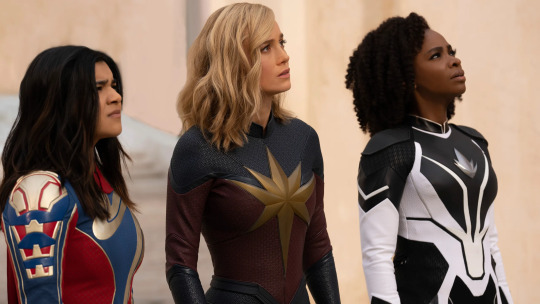
The Marvels was directed by Nia DaCosta, an award-winning Harlem native and creative visionary whose approach to this film was to define these characters as humans, not as superheroes. Her approach to heroism directly addresses that the idea that a hero is not always right. A hero, DaCosta claims, is "someone who's trying their best with the information and tools they have at the time. They'll always get it wrong." Carol Danvers's arc directly addresses this, as the resolution of her subplot involves her re-igniting the sun that she snuffed out. Her heroic act is to undo the damage that she wrought.

When compared to old Marvel, this message just doesn't come through. In WandaVision, Wanda's grief is for a family that was killed by the Avengers. Yet, she is painted as a villain, even as she searches for a happy home, even as she at one point joins the Avengers. The Avengers cannot undo what they did, and don't really try. They defeat the big bad, sacrifice their lives, but nothing brings back Wanda's family. Nothing undoes that war. No one searches for Wanda after the event, to try to help her with her grief, except for Monica, and she's working against orders. Their heroics are militant, but while they excel at destruction, they leave the people they hurt in the dust.
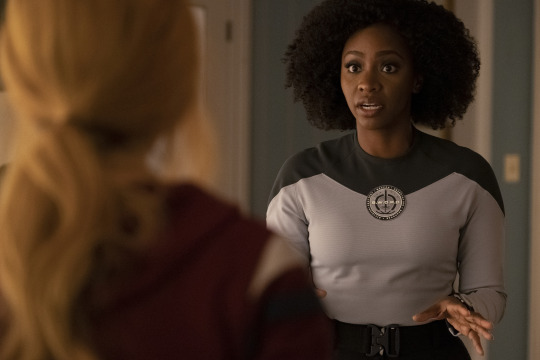
This antiheroic plot of old Marvel is precisely what appealed to so many American audiences. Their protagonists are: a rich corporation, a super-soldier, a privileged teenager, a scientist who makes weapons, an ex-convict, a man born into godlike power, and I'm sure there are others but I don't actually care that much... (these would be iron man, captain america, peter parker spiderman, hulk, antman, thor, and etc). All these archetypes appeal to American ideals that the wealthy would sympathize with. They claim that there are people who are inherently bad and seek the power that they have, in the way that a poor person might want a job that a wealthy person wants their child to secure. They claim that it is their business to save those which cannot save themselves, and use this to get involved in wars that are not theirs, and beat up badguys whose backstory they have no way of knowing-- and they punch before they stop and listen.
They are cops in every sense of the word. The responsibility of the vigilante is to defend against evil, but part of that responsibility is to figure out who exactly is evil and who is in need of help.
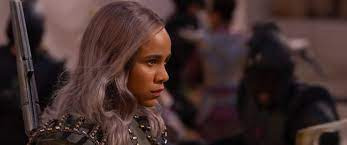
The Marvels creates a team that tries to distinguish evil from good, and delves into the grey area between them. The final battle between Carol Danvers and Dar-benn has the superhero pinning the grey-haired antagonist to the ground as she begs for, then demands, that Carol fix what she damaged. Monica urges her to listen. Through this, The Marvels argues that a hero does not always beat up the bad guy and fight against unrelenting evil, but that a hero can be wrong, and that a hero can reconsider. It's kindness in the way that is revolutionary, where it's much easier to choose cruelty.
The fact that the movie is getting torn apart by critics, then, is not just because it is a "girls movie" or it doesn't have a strong white man for the white male viewer to sympathize with. The Marvels cannot appeal to Marvel fans because it rewrites the genre itself. It takes a film series whose purpose was to depict the struggles of cops, of the wealthy, of people with too much power who are trying to learn how to responsibly wield it, but don't. And it gives that power to people who have watched superheroes try and fail, who are slowly learning to be better heroes than the ones before them.
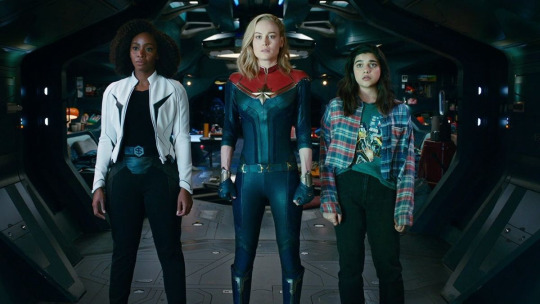
The next generation is a critique of the last, a group trying not to make the mistakes of the chosen ones that came before them, and as such, the movie exists to critique the movies that came before it. Therefore, a viewer of Marvel who would positively review it, due to sympathizing with the previous heroes and enjoying the power fantasy, would dislike it out of its existence being critical and contradictory to the films they like themselves.
The Marvels is not for Marvel fans-- at least, not those who saw the Avengers as purely heroes. Instead, the film reaches out to people who would have been against the old Avengers, who want a story that dismantles the unquestioned idealism of superheroes and writes about people trying to protect their communities and the people they care about.
So, let the critics complain. The MCU is shedding its roots as a pro-cop and pro-colonialism power fantasy, and evolving into an exploration of what it means to be a true hero.
#the marvels#ms marvel#captain marvel#photon#kamala khan#monica rambeau#carol danvers#.pyro#pyro.txt#the marvels analysis#can you tell that i loved this movie#it's been so long since i've done an analysis but this one SPOKE to me#anyways i'm coming from the perspective of a marvel hater until i watched ms marvel#honestly i just put the images in there to break it up. they are not very relevant. i didn't pirate so i don't have good screenshots
303 notes
·
View notes